archive
I am delighted to bring you our latest newsletter from the School of Social Sciences, Education and Social Work (SSESW) at Queen’s University Belfast.
Across our work in Criminology, Sociology, Social Policy, Education and Social Work we consistently strive to make a difference, be it through preparing our students to become high quality professionals and active citizens, or through our research making a positive difference to people, communities and policy in Northern Ireland and beyond.
This newsletter provides some recent highlights from our work across different areas in the School, and I hope this will spark your interest and imagination. We are keen to connect, and keen to hear from and work with you, so do get in touch if any of the work we report in this newsletter is of interest, or if there are any other areas you would like to connect with us on.
Professor Daniel Muijs
Head of School of Social Sciences, Education and Social Work
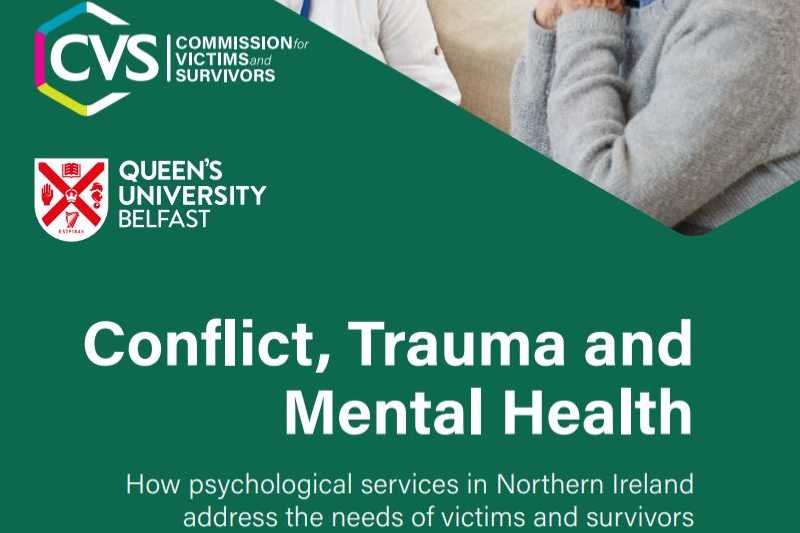
A report for the Commission for Victims and Survivors for Northern Ireland (CVSNI) found that ‘twenty five years after the Good Friday [Belfast] Agreement, we still see scars of conflict both in those that experienced it and in intergenerational trauma passed on to children and young people in the most affected communities’. It highlighted that more psychological services are needed for victims and survivors of the Troubles.
The report, entitled Conflict, Trauma and Mental Health: How psychological services in Northern Ireland address the needs of victims and survivors, included a series of reviews and studies and was commissioned by the CVSNI, funded through the EU's Peace IV programme.
School of SSESW academic Michael Duffy was principal investigator for the project team which produced the report. It reviewed psychological services for victims of the Troubles and offers ‘proposals on the optimal way to organise mental health services for victims and survivors in the primary, community and statutory systems’.
Michael said: "The studies analysed outcome data relating to mental health needs of victims and survivors of the Troubles from services across health and social care trusts and the community and voluntary sector in Northern Ireland, and the border regions in the Republic of Ireland, in order to make recommendations for future service provision."
At the launch of the report in August, key findings were outlined by Michael Duffy, with Queen’s University colleagues Anne Campbell, Tracey McConnell and Carolyn Blair, John O’Hanlon from the Belfast Health and Care Trust, and Brian Fitzmaurice from Trinity College, Dublin. See Conflict, Trauma and Mental Health for the full report and recommendations.
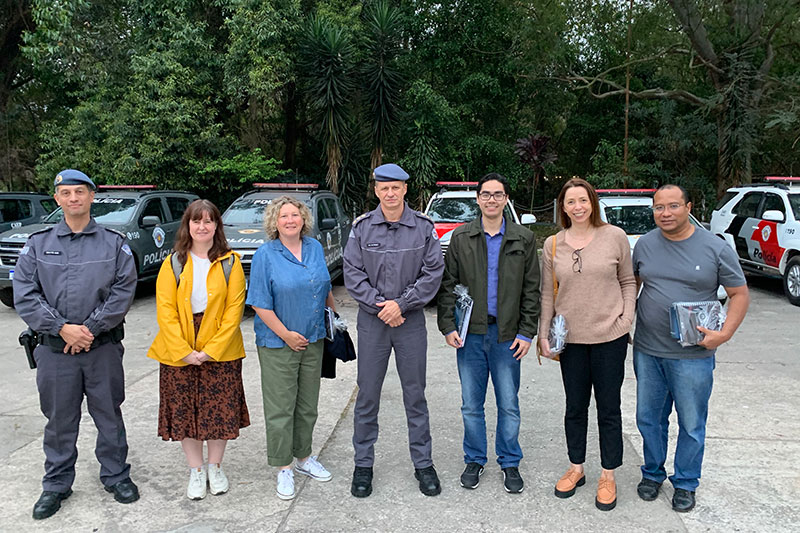
Michelle Butler and Siobhán McAlister from our Criminology team joined colleagues at the Centre for the Study of Violence, University of São Paulo, Brazil in August as part of a partnership project exploring crime, security and legitimacy in border regions. The project is funded by Queen’s University Belfast (QUB) and The State of São Paulo Research Foundation (FAPESP) and aims to enhance collaboration between researchers at QUB and FAPESP through exchange visits and initial data collection, with a view to developing future research proposals.
The visit was facilitated by University of São Paulo hosts Professor Marcos Cesar Alvarez and Gustavo Higo, who visited Queen’s in June to join the SSESW colleagues in an earlier stage of the project exchange, and by Camilla Dias and Fernando Silla who specialise in prison research and organised crime. While in Northern Ireland, Marcos and Gustavo met with members of the Police Service of Northern Ireland who work in border areas, to learn about policing during the Northern Ireland Conflict, policing with the community and the complexities of policing a porous and largely invisible border. Marcos and Gustavo also presented a paper entitled ‘Violence, Organised Crime and the State: The Dynamics of Crime and Control in the Brazilian Border Regions’ as part of the Institute of Criminology and Criminal Justice Seminar Series (a QUB partnership that includes the School of Law and the School of SSESW).
While in Brazil, Michelle and Siobhán shared preliminary research findings on ‘Crime, Conflict and Borders in Northern Ireland’ with academics and representatives from the Military Police and the Civil Police. They made site visits to battalions of the Military Police and Civil Police, learning about policing and organised crime in São Paulo and making connections for future research with academics in the Centre for the Study of Violence.
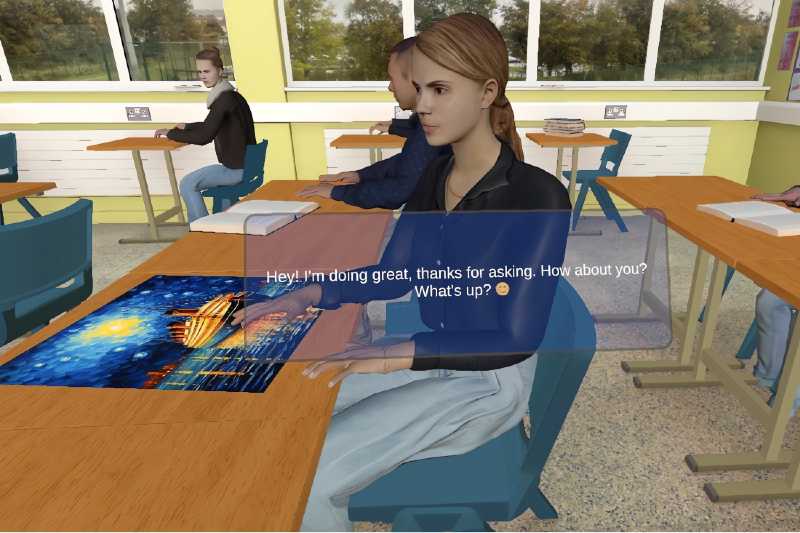
Nichola Booth and Paul Best from our new Centre for Technological Innovation, Mental Health and Education (TIME), with Chris Thomas from ProPeer Solutions, have developed and tested a new Classroom Assistant Training tool using Virtual Reality technology (CatVR). The project is a collaboration with South Eastern Regional College, with Phase 2 testing completed in October 2023.
This project is funded by UFI VocTech, a scheme supporting the delivery of adult vocational skills through digital technology. In Northern Ireland the number of classroom assistants employed has been steadily increasing (IPSOS Report, 2023) and was a group recognised by UFI VocTech as crucial for innovative training.
Classroom assistants are critical for providing targeted help to pupils, supporting children with complex mental health needs, managing behaviour, promoting inclusion and providing pastoral support. CatVR was designed to offer virtual instruction, allowing trainee assistants exposure to common behaviour challenges they may encounter in a classroom, with the goal of increasing role expectancy and confidence among this staff group.
The first module in CatVR is an immersive 360° classroom environment with several situations that could be considered inappropriate or disruptive, with the user tasked to identify those behaviours. The experience is similar to a driving-based hazard perception test and the faster the issues are identified the more ‘points’ a user gets. The second module involves engagement with a virtual pupil avatar while asking a series of questions to figure out difficulties for the pupil. This step enables a conversation to take place to suggest some solutions that may help, with ongoing feedback and problem solving responses provided.
Further testing with other groups, including trainee teachers and qualified teachers, is planned for 2024 with the addition of new scenarios and more avatars, increasing access to a wider range of classroom issues.
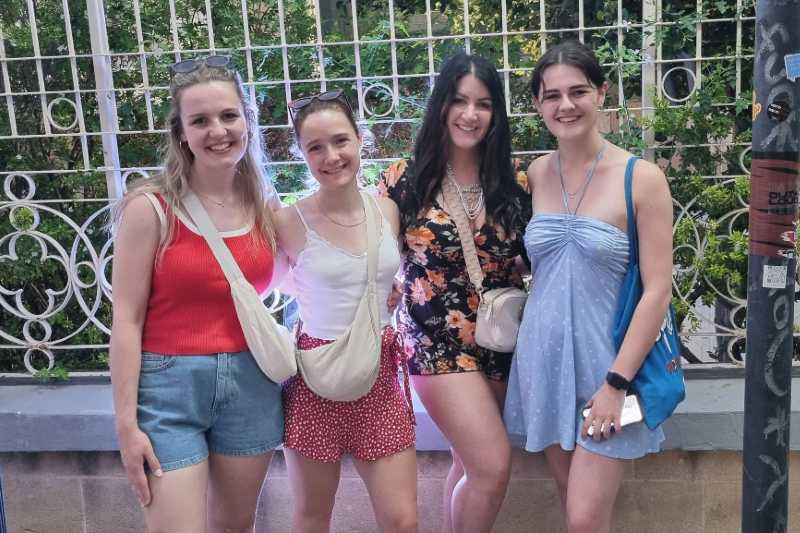
Academics Lesley Emerson and Tony Gallagher were accompanied by students from our Postgraduate Certificate in Education (PGCE) on a trip to Cyprus in July to participate in a symposium on teaching controversial issues and contested narratives. The Home for Cooperation event involved colleagues and students from Cyprus, Lebanon, Denmark, Norway and Northern Ireland. It was part of the ConCitizen project which supports student teachers in addressing controversial issues and contested narratives in the classroom.
Funded by Erasmus+, ConCitizen includes teams from University College Copenhagen KP, Queen’s University Belfast (Tony Gallagher, Lesley Emerson and Gavin Duffy), Stranmillis University College (Norman Richardson), Oslo Metropolitan University, the Open University of Cyprus and the Adyan Foundation, Lebanon.
To date, colleagues have been collaborating in a number of transnational meetings and activities (including Copenhagen in April 2023 and Belfast in September 2023) to share and develop strategies for teaching controversial issues and contested narratives in History, Religious Education and Citizenship Education. This has also involved comparative curriculum mapping and research into the needs of teachers in relation to teaching these issues, which in turn informed the production of video tutorials and a series of virtual exchanges between student teachers from the participating institutions.
The event in Cyprus provided our PGCE students (pictured) Nadia McConville, Jenny Steele and Amy Patterson and Stranmillis student Lois Smyrell with the opportunity to meet and work with academic colleagues in the co-production of the project’s outputs. During the symposium, Jenny Steele and Nadia McConville were able to present findings from their own classroom-based research on young people’s views on whether teachers should be ‘neutral‘ when teaching controversial issues.
The final output of the project, a textbook for teachers, will be launched at the concluding conference of the project in Oslo, June 2024.
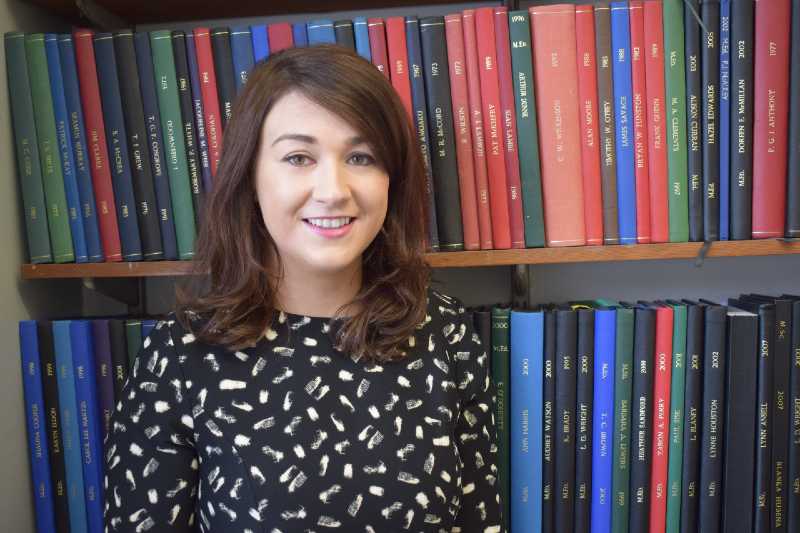
My social work academic journey began in September 2009, when I started the Social Work Relevant Graduate Route degree at Queen’s University. I qualified as a social worker in July 2011. I then completed a Postgraduate Certificate in Professional Development in Social Work at Ulster University. In 2015 I completed the Postgraduate Diploma in Mental Health Law at Queen’s which qualified me to act as an Approved Social Worker (a statutory role under mental health and mental capacity law).
In 2018 I finished my Masters in Applied Social Studies at the School of SSESW at Queen’s with the successful completion of the Specialist Practice Masters Dissertation Module. My Masters study explored ‘Resilience in Approved Social Workers in Northern Ireland’. I had an excellent postgraduate experience and got to know the SSESW academics who shared my research interests.
Masters study at the School of SSESW developed my focus on research relevant to social work practice and I quickly realised that research was an area I wished to pursue further. I began my Doctoral study in October 2019. My PhD supervisors, Dr Lorna Montgomery and Professor Gavin Davidson, shared my interest in exploring Mental Capacity and provided great support throughout my PhD journey. It wasn’t a typical doctoral student experience as I commenced my studies at the beginning of the COVID-19 pandemic and, therefore, much of the early stage of my PhD was completed online. However, since then I have had the opportunity to attend and present my work at conferences both locally and internationally.
I passed my PhD viva in August this year with a thesis on ‘Decision-making processes in Learning Disability services: in whose best interests?’ The next step is to share my doctoral study findings with individuals for whom they are relevant and with stakeholders and other associated groups, in order to implement the identified recommendations.
I’m delighted to have taken up the role of Lecturer in Social Work in the School of SSESW at Queen’s University recently. I aim to develop my teaching in social work practice and undertake further research, including co-producing research with individuals who have a learning disability and expanding my existing work around issues in Mental Capacity.

Our research centres and networks are the key mechanisms for delivering and optimising our interdisciplinary research. After a review of SSESW research activities, we have re-launched with nine research centres:
- Centre for Children’s Rights, which is internationally renowned for its research on children’s rights aimed at improving their lives.
- Centre for Shared Education, which is committed to promoting sharing in education as a mechanism for delivering economic, social and educational benefits to children, schools and society, particularly in post conflict societies.
- Centre for Language Education Research, which conducts research in language and education to make a difference across local, national and international contexts.
- Centre for Inclusion, Transformation and Equality, which addresses core themes of: disability; gender and LGBTQ+; equality in education; and ethnicity, race and decoloniality.
- Centre for Technological Innovations, Mental Health and Education, which develops technology-based, interdisciplinary research in mental health and professional education and training.
- Centre for Child, Youth and Family Welfare, which provides insights into the lives of children, young people and families to achieve better welfare outcomes and improve wellbeing.
- Centre for Justice Studies, which provides a focus for criminological research.
- Centre for Behaviour Analysis, which focuses on the discovery of natural laws of behaviour, the study of how behaviour is shaped by environmental contingencies and how changes affect behaviour.
- Methods@SSESW, which is a pilot centre bringing together those with cutting edge expertise in qualitative and quantitative methods into one space.
There is also one research network, the Drugs and Alcohol Research Network, that aims to provide a leading edge one stop venue for all researchers, policy-makers and practitioners in Northern Ireland who together aspire to make a difference in developing an informed research agenda on alcohol and drug use.
Many SSESW colleagues also contribute to the Queen’s University Senator George J. Mitchell Institute for Global Peace, Security and Justice, to Queen's Communities and Place and to ARK, a social policy hub.
You can read more about the centres on the Research section of the SSESW website.
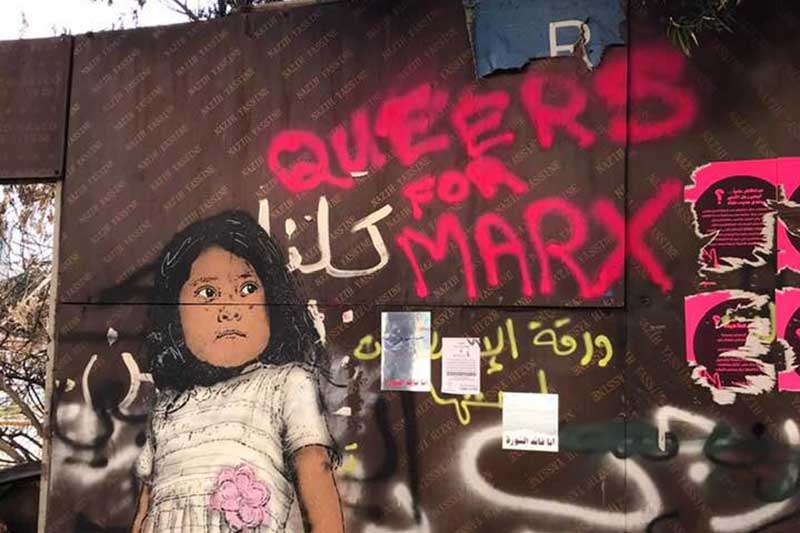
Ready to make an impact? Join the new MSc Sociology and Global Inequality programme at Queen's University! Applications are now open for September 2024 intake. Inequality has become one of the most significant issues in the contemporary world, and at a global scale. It contributes to religious fundamentalisms and populist movements. It drives civil wars and conflicts that reshape international relations.
Inequality also generates demands for gender and racial equality and LGBTQ+ rights and prompts calls for governments to deal with increasing levels of socioeconomic inequality. As such, it contributes to new forms of politics and socio-political activism, often beyond the boundaries of nation-states.
Our MSc Sociology and Global Inequality programme equips students with the intellectual and methodological skills to engage in social inquiry at an advanced level, to understand inequality and how it is contested.
Aligned with UNESCO's Sustainable Development Goals, the MSc offers modules that delve into crucial topics including work, gender, justice, emotions, identity, norms, power, religion, migration and citizenship, all of which are key to addressing these pressing issues.
The MSc Sociology and Global Inequality provides ‘Education for Social Impact’ both at local and global levels. See Sociology and Global Inequality for more information on module content and how to apply for the course. Don't miss your chance to shape a more equitable world!
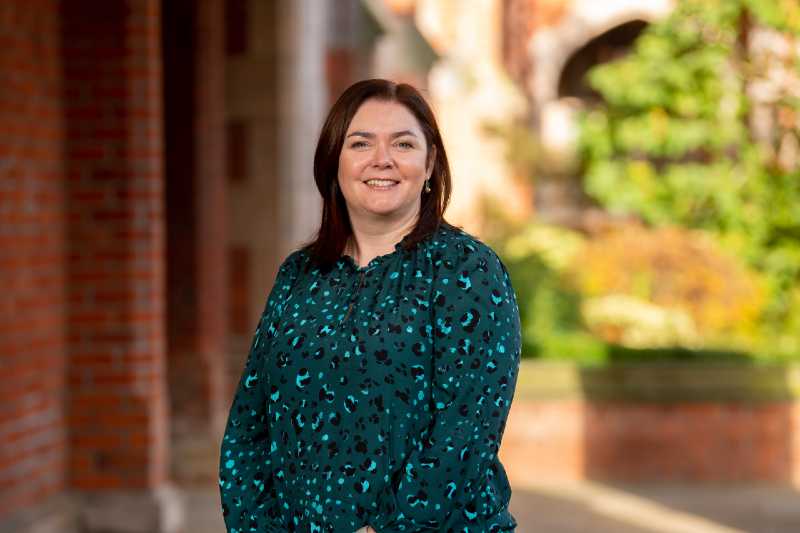
In September, Professor Berni Kelly co-hosted a Global INTRAC knowledge exchange at the University of Sussex, England, on care leaving policy and research across various country and cultural contexts. The event was live streamed online to members worldwide. Berni is a member of the Executive Committee of INTRAC (International Research Network on Transitions to Adulthood from Care). She is also Director of our Centre on Inclusion, Transformation and Equality.
Global INTRAC has over 350 members engaged in care leaving research, representing 48 countries across the world. At the event, global experts in the field of care leaving presented on current research and policy developments in their countries including representatives from: University of Johannesburg in South Africa; University of Bedfordshire in England; Ben-Gurion University in Israel; City University New York; Aalborg University in Denmark; University of Ghana; VID Specialized University in Oslo; Universidad Católica Boliviana in Bolivia and Udayan Care in India.
An interactive World Cafe engaged participants in networking and sharing of ideas on care leaving. Key themes included: extended care and aftercare arrangements across country contexts; programmes for preparing youth for leaving care; promoting the participation of care-experienced youth in research and policy; and informal social support for care leavers. The meeting also addressed underlying barriers and inequalities experienced by care leavers, often underpinned by limited resources and support services. These global challenges for care leaving policy, practice and research will be the core focus of the next Global INTRAC conference, to be held in Johannesburg, South Africa in 2025.
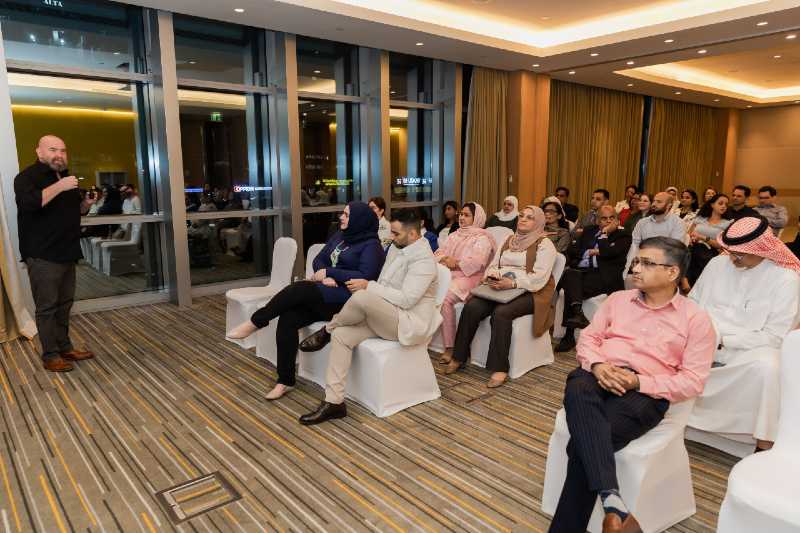
In October, SSESW academic Gavin Duffy joined staff from the wider University on a trip to Jeddah in the Kingdom of Saudi Arabia (KSA) and Dubai, United Arab Emirates (UAE) as part of a Queen’s University Belfast interactive visit to showcase its academic excellence and to make connections with key stakeholders in the KSA and UAE education sectors.
The five-day Queen’s programme of engagement across both locations involved delivering a series of inspiring sessions and activities in high schools where students had opportunities to get involved in interactive workshops involving computer engineering, programming and learning how to extract DNA from fruit, and to learn more about Queen’s University.
One of the highlights of the visit was the 'Leadership for Change' workshops led by Dr Gavin Duffy, Programme Director of our MSc Educational Leadership programme. Tailored for school principals, vice-principals and careers guidance counsellors, the workshops in Jeddah and Dubai gave attendees insights to enhance their leadership skills and tools to drive positive change in educational settings. Participants received a certificate of participation from Queen’s University, fostering professional development and networking opportunities with Queen's experts.
Commenting on the trip, Gavin said: “Providing the workshops for school leaders and counsellors was an amazing opportunity to work with so many educational practitioners and learn about the educational contexts in Jeddah and Dubai. In these sessions, participants examined the pivotal role that school leadership plays in promoting school improvement and managing change effectively.”
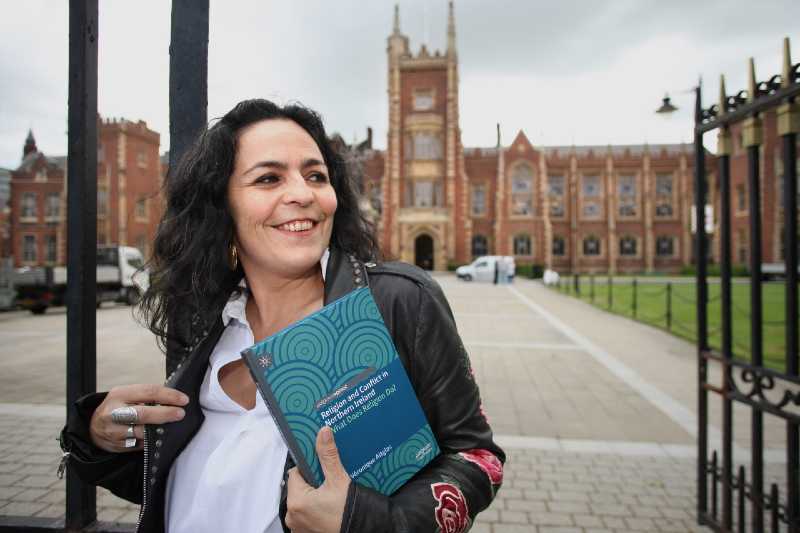
My research interests lie in the current trends of religious life. I completed my PhD at the Ecole Pratique des Hautes Etudes in Paris in 2004 on the ways in which practices such as yoga and meditation have been appropriated by westerners. Thanks to a grant from the Economic and Social Research Council, I then studied the popularisation of Kabbalah in France, Britain, Brazil and Israel.
By comparing the diffusion of Kabbalah with the dissemination of Hindu religions, I developed an analysis of western societies’ fascination for the religion of Others, in a book called From Yoga to Kabbalah: Religious Exoticism and the Logics of Bricolage (2014), for which I won the International Society for the Sociology of Religion book award in 2017.
But exoticism and eclecticism also exist in conservative Christianity. I am currently drawing on a four-year ethnography to write on a local ‘messianic’ congregation and the ways in which it combines elements of Evangelical Protestantism and Judaism. I am also particularly interested in what we call ‘epistemology’ – in other words, how can we produce scientific knowledge without it being distorted by our personal identity, experience and trajectory? My latest book, Religion and Conflict in Northern Ireland: What Does Religion Do? (2022) is the first critical and comprehensive review of the ways in which the social sciences interpreted religion’s significance in Northern Ireland. Through this regional case, the book outlines a critical agenda for the social study of religion.
I teach introductory sociology and the sociology of religion to undergraduate students, and teach research design to postgraduates. Since I started working at Queen’s, I’ve held numerous leadership roles. I’m the representative for academic staff on the University's Senate. I’ve played a central role in designing an Irish language residential scheme to enhance students’ learning experience, for which I received Queen’s ‘Leading by Example’ Award last year. Finally, my latest project is coming to fruition! With the support of the Sociology team, I developed a new MSc Sociology and Global Inequality, available from September 2024. This exciting programme focuses on the most important issues across the world today and I am really looking forward welcoming its first students!
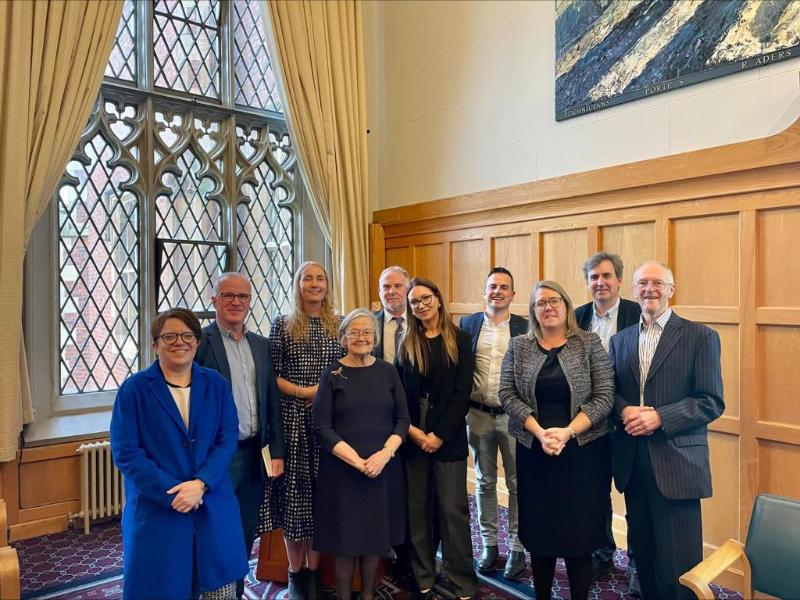
In October, leading experts in mental health and children’s law gathered at Queen’s University Belfast for the Protecting and Promoting the Decision-making Rights of Children symposium on critical developments in law and policy relating to children in Northern Ireland.
The event was organised by SSESW colleague Professor Gavin Davidson (back row, right) with Dr Colin Harper (Honorary Lecturer, SSESW), Professor Roy McClelland (Emeritus Professor, School of Medicine, Dentistry and Biomedical Sciences) and representatives from the Royal College of Psychiatrists. It was hosted by our Centre on Inclusion, Transformation and Equality.
Presentations and discussion focused on the current legal framework for decision-making by children, recent case law (specifically Re D (A Child) {2019} UKSC 42) and options for changes to law, policy and practice.
The symposium was chaired by Dr Claire McKenna (Belfast Health and Social Care Trust) and included presentations from Lady Brenda Hale, (former President of the Supreme Court), Professor Roy McClelland and Dr Frances Doherty (Belfast Trust) on legal and practice complexities at the interface of mental health and mental capacity issues. Dr Colin Harper, Dr Phil Anderson and Gavin Davidson led an exploration of options relating to children’s capacity and right to make decisions, including: retain the current combination of statute law but develop new guidance; codify case law to clarify circumstances where children under 16 can accept and refuse interventions; amend the Children (NI) Order 1995 to provide a more comprehensive framework for decision making; extend the Mental Capacity Act (NI) 2016 to apply to everyone; or develop a new law specifically for those under 16.
A panel discussion on next steps acknowledged the complexities involved but reinforced the need for this important area of law, policy and practice to be further examined to ensure we have the most effective framework to protect and promote the decision-making rights of children.
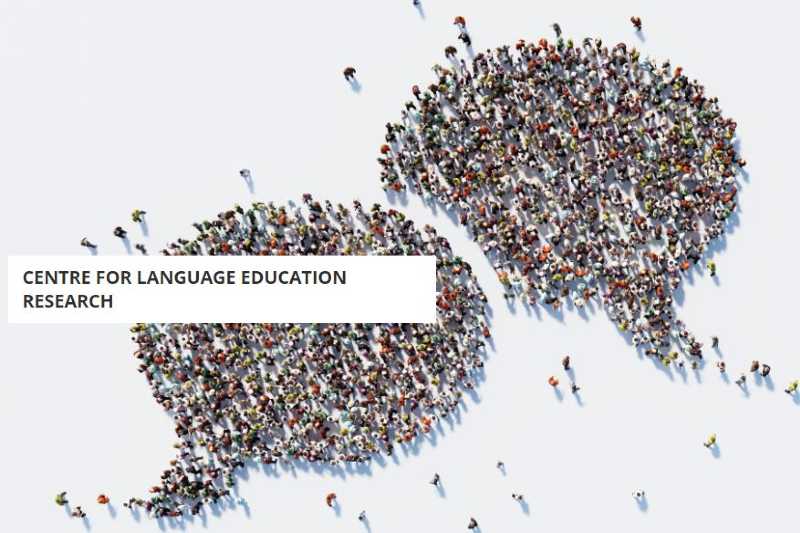
The Centre investigated the additional competencies and workloads of Irish Medium Education (IME) practitioners. In Northern Ireland, teacher shortages and the lack of dedicated opportunities for Teacher Professional Learning in IME potentially contributes to sustained educational underachievement for pupils (Fair Start Policy 2021).
Mel Engman, Aisling O’Boyle, Yecid Ortega and Sultan Turkan conducted a systematic literature review of immersion education in international contexts and conducted primary research with IME sector stakeholders in Northern Ireland. Report: Fair? Shared? Supported? Examining expectations and realities for Irish-medium practitioners.
Ibrar Bhatt gave the closing plenary at the British Association of Applied Linguistics annual conference and delved into the complex background to the term ‘postdigital’. In Postdigital Possibilities in Applied Linguistics, Ibrar argued that the relationship between the digital world and human life is deeply interwoven and this offers new avenues for inquiry in applied linguistics. One primary takeaway was the importance of a ‘broadly defined’ research scope for applied linguistics, through a postdigital framing.
Minchen Liu won the BERA Award for Best Presentation Prize for the 'Special Interest Group: Post-Compulsory and Lifelong Learning' at the British Educational Research Association Annual Conference in September. Min’s presentation covered findings from the British Academy-funded research project ‘Languages Provision in UK Further Education’, conducted by Ian Collen, Leanne Henderson, Minchen Liu, Aisling O’Boyle and Jennifer Roberts.
Yecid Ortega’s new publication Processes influencing English language policy and teaching practice discusses influences on language policy-making decisions in the teaching of English as a foreign language (EFL). Published in the journal Critical Inquiry in Language Studies, Yecid’s paper prioritises an understanding of participants’ experiences and exposes the inequalities they faced in a marginalized context.
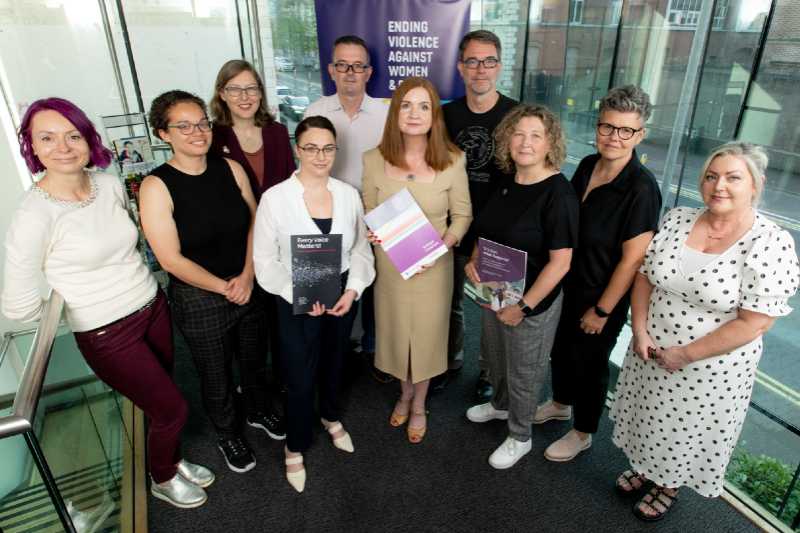
A new Centre for Children’s Rights report found that 73 per cent of girls aged 12-17 reported having experienced at least one form of violence. ‘It’s Just What Happens’: Girls’ and Young Women’s Views and Experiences of Violence in Northern Ireland is one of two reports commissioned by the Executive Office to inform the Strategic Framework to End Violence Against Women and Girls.
The Queen’s University report was led by SSESW colleagues Siobhán McAlister, Dirk Schubotz and Michelle Templeton, and Gail Neill from Ulster University. The findings were based on responses from 268 girls and young women across Northern Ireland and include:
- The persistent nature of ‘everyday violence’ with almost all experiencing catcalling and street harassment from age 10-11.
- Girls receiving frequent unsolicited messages and sexual images from a young age. They considered this a normal part of their online life.
- The top three barriers to girls reporting violence were: worried they might not be believed; worried it might make the situation worse; and not feeling it was serious enough to report.
- Learning about violence against girls and young women was identified by the participants as an important step in prevention. This should happen at a young age for boys and girls, in families, schools and youth provision.
Siobhán McAlister (front row, right) said: “Participants reported little formal learning about violence in school. This, alongside powerful social messages of blame and responsibility, impacts girls’ ability to recognise violence and their willingness to disclose personal experiences. Girls learn that they need to ‘keep themselves safe’, thus removing responsibility for violence from boys and men. They emphasised the need to support boys and young men in recognising the impact of their attitudes and behaviours, and to disrupt negative attitudes towards women at a broader societal level.”
Read the report on violence against women and young girls on the Executive Office website.
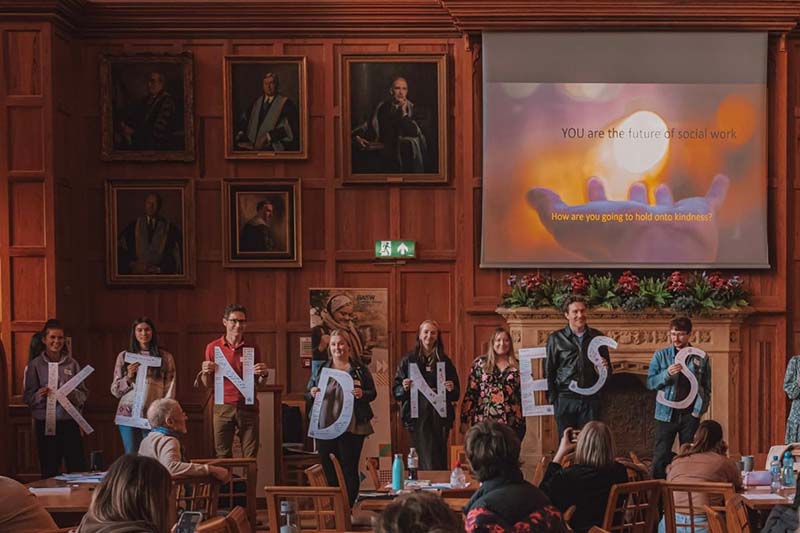
Queen’s Social Work Society students were excited to host their inaugural conference in October for our Social Work students and staff, exploring the power of kindness and how students can nurture and grow kindness in their social work practice.
The student organisers of Holding onto Kindness in Social Work said: “The conference was an inspiring day using creativity, reflection and discussion to explore the power of kindness in social work. It was a great way for Social Work students at Queen's University to further develop their knowledge and skills in this important aspect of their future career as social workers.”
The event was supported by the School of Social Sciences, Education and Social Work (SSESW) and the British Association of Social Workers Northern Ireland (BASW NI). It included keynote addresses by Professor Leah Dominelli from Stirling University, Professor Gillian Ruch from the University of Sussex and Siobhan Maclean, social work practice teacher and acclaimed author, alongside a diverse range of speakers across social work practice and academia, students and mental health campaigners, all of them leaders in kindness.
The conference provided all SSESW student attendees with a reflective and creative space to hold in-depth conversations on the importance of kindness. This was explored further through the use of literature and a poem written especially for the day to help make connections with kindness, empathy and critical reflection, drawing on current societal issues pertinent to social work, such as poverty, welfare reform and mental health stigma. There were also opportunities to call at information stands and to network with visiting organisations and employers, all arranged by the student organisers, including Northern Ireland Social Care Council, Probation Board for Northern Ireland, Belfast Health and Social Care Trust and Youth Justice Agency.
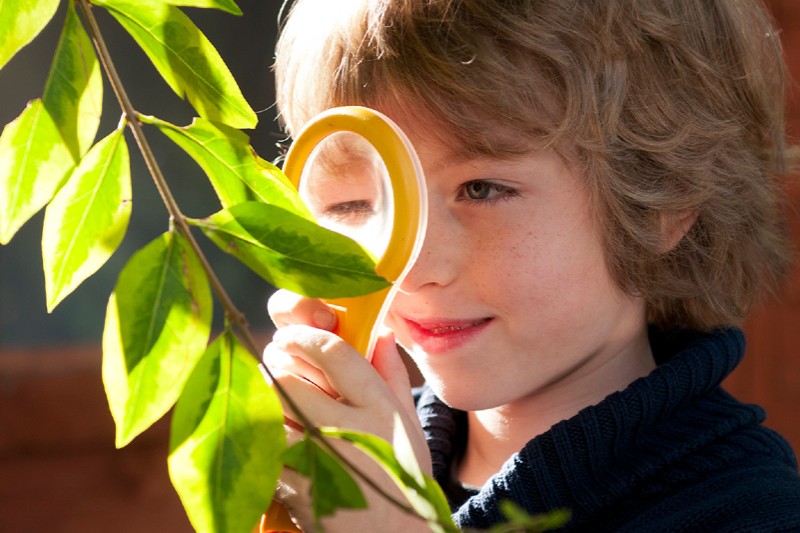
Our Centre for Behaviour Analysis (CBA) leads the way in efforts to gain professional recognition for behaviour analysts across Europe and further afield. The lack of professional regulation means that anyone could call themselves a behaviour analyst regardless of their training or experience. Clearly, this means service user safety is compromised and professional mobility is restricted.
For the most part, internationally, behaviour analysts have adhered to the standards set by the USA-based Behavior Analyst Certification Board (BACB). However, BACB certification has not been recognized officially in jurisdictions outside of North America. The realization of this situation has led the CBA team to take a number of significant actions. Since 2009, CBA colleagues have been involved in working towards achieving professional recognition for behaviour analysts in the UK. This was finally achieved in 2023 by the Professional Standards Authority approving the professional register of the UK-Society of Behaviour Analysis (UK-SBA).
Internationally, the CBA team played a leading role in achieving professional recognition of behaviour analysts in the Czech Republic and the United Arab Emirates.
In Europe, the CBA team has partnered in the EU-funded EuroBA project with nine universities and autism charities to develop common standards and competences for behaviour analysts to facilitate national recognition of and mobility for behaviour analysts outside USA/Canada. In 2020, CBA Director Karola Dillenburger set up the Professional Advisory Group (PAG), a collaboration of 22 countries that aims to ensure that European and allied countries have full access to the Intellectual Outputs that were developed in the EuroBA project to support countries in gaining national professional recognition for behaviour analysts. PAG members represent their national behaviour analysis organization. Membership is open to all countries and includes one representative per country.
Read more about the work of the Centre for Behaviour Analysis.
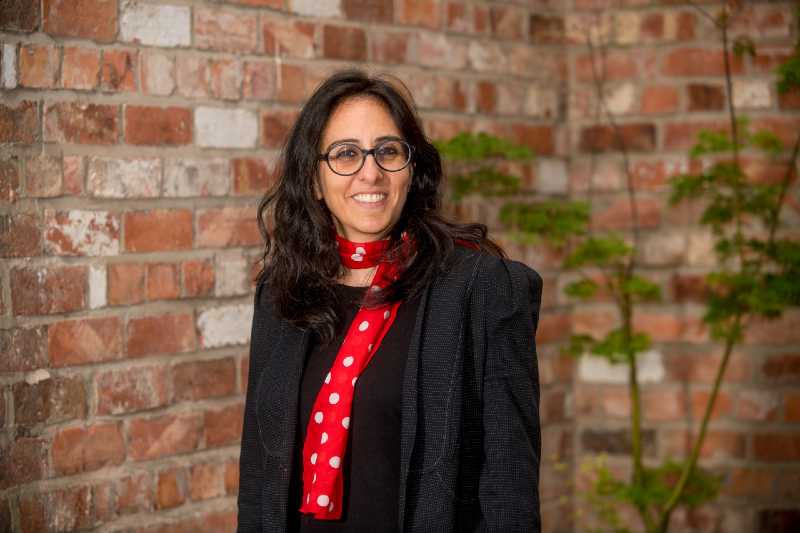
War as Protection and Punishment, the latest book from SSESW academic Teresa Degenhardt (Criminology), analyses how penal discourses are used to legitimate post-Cold War military interventions through case studies on Kosovo, Iraq and Libya. The book traces the historical arc in which military interventions have increasingly been launched, through reference to both the human rights discourse and humanitarian sentiments, and a desire to punish the perpetrators.
It continues with the analysis of practices involved in the post-intervention phase, looking at the ways in which states have been established as modes of governance (Kosovo), how punitive atmospheres have animated soldiers’ violence in the conduct of war (Iraq), and how interventions can expand moral control and a system of devolved surveillance in conjunction with both border control and the engagement of the International Criminal Court (Libya). These practices underscore how punitive intents and the rhetoric of punishment were useful in legitimating the expansion of liberal governance.
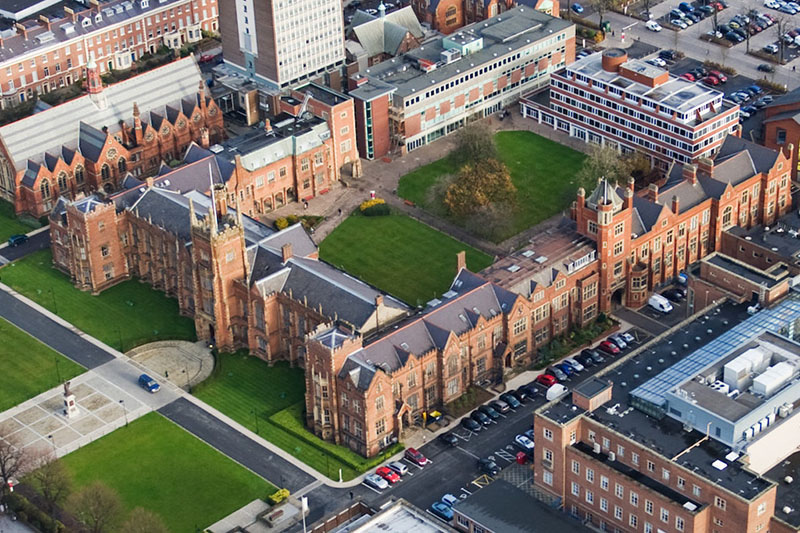
Head of School, Professor Daniel Muijs, was delighted to report further recognition of the high quality and impact of teaching and research in the School of Social Sciences, Education and Social Work (SSESW).
Paul McCafferty (Social Work) was presented with a Queen’s University Teaching Award, in the ‘Rising Star’ category, at the most recent graduation ceremony. Paul received the award for his work in redesigning his modules to provide a learning experience that prepares his students effectively for social work practice.
His teaching in Social Work incorporates a range of inclusive teaching approaches, authentic assessment and work-based learning opportunities to engage his students and provide an active learning experience that meets the needs of a diverse student body. Paul said: “Delivering teaching and assessment that meets employers’ and students’ needs is a passion of mine, so I’m delighted to receive this award.”
A presentation by Research Fellow Min-Chen Liu about our Languages Provision in UK Further Education research project was awarded the 'BERA Conference 2023 – Special Interest Group (SIG) Best Presentation' prize in Post-Compulsory and Lifelong Learning. The award emphasises the project's outstanding quality and its meaningful contribution to the realm of post-compulsory and lifelong learning, particularly in the context of language provision in the UK's Further Education sector.
Min said: “Being awarded a SIG Best Presentation prize for the BERA Conference input is a tremendous honour, both personally and professionally. It underscores the significance and potential of our research in post-compulsory and lifelong learning, especially within the UK's FE sector. This national recognition motivates me to continue improving educational practices and opportunities.”
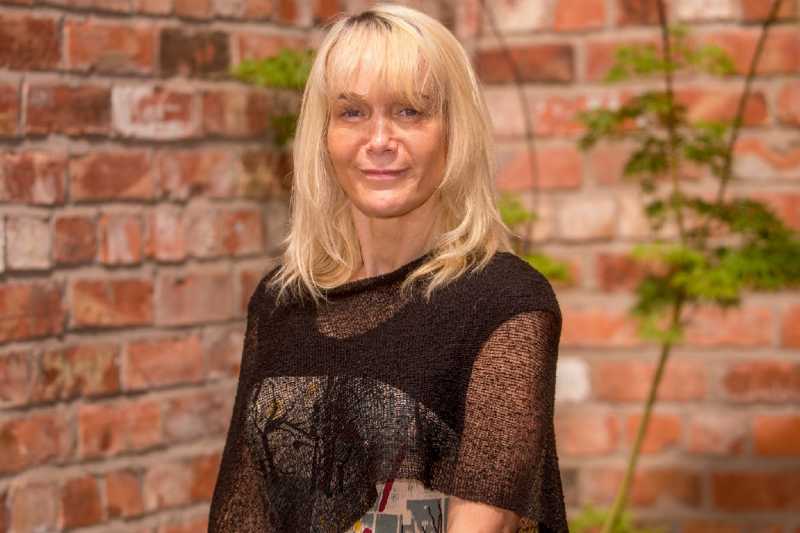
Our Drug and Alcohol Network (DARN) is leading on the Northern Ireland arm of a project called DoseCare: Development and Evaluation of a Wearable-Integrated, AI-Powered Overdose Detection and Response System. The project aims to harness the power of artificial intelligence (AI) to revolutionise overdose detection and prevention mechanisms in healthcare using wearable technologies and smart phone applications.
DoseCare is one of twelve projects awarded a share of £5 million of government funding to reduce rates of fatal drug overdoses across the UK. It is a collaboration between Queen’s University Belfast, Manchester Metropolitan University, Extern and the Salvation Army.
By focusing on two distinct user groups (people who are leaving prison and people who are homeless) with varying levels of risk awareness, the research team will develop tailored solutions that significantly improve patient outcomes and enhance overall care delivery. The wearable device will utilise respiratory rate and O2 levels among members of the user groups to detect the onset of an opioid overdose and will contact drug workers and the emergency services. It will use machine learning to predict the optimum conditions for responses, which need to be accurate and timely.
In addition to the DoseCare initiative, DARN is leading on producing a special edition of Frontiers in Public Health, entitled Alcohol-related brain Injury – psycho social, medical and multidisciplinary approaches.
Furthermore, the Drug and Alcohol Network has been chosen to lead on ITSPOON, an international network of addiction professionals and researchers who are researching technological innovation to address drug-related deaths.

In September, the Centre held a symposium on children’s rights-based participation in education. Keynote speakers included Professor Roseanna Bourke and Professor John O’Neill, Massey University, New Zealand who presented on ‘what children can tell us about the phenomenon of learning’.
Dr Naseema Shaik, Head of Education at Cape Peninsula University of Technology, South Africa visited Queen’s University in September and spoke at the CCR symposium in September (above) about her work on early childhood.
In September, Siobhán McAlister was invited to take part in a Department of Justice-Queen’s University Belfast Policy Workshop and Strategic Engagement event to share research findings and discuss rights implications of Child Criminal Exploitation (CCE) in Northern Ireland. Drawing on her research, she discussed various forms of CCE and how this is associated with conflict legacy.
Bronagh Byrne was interviewed for UTV’s View from Stormont on the challenges facing children identified as having special educational needs in light of the lack of sufficient educational placements, funding cuts and resourcing restrictions.
Alan McKinstry, PhD student, published an article in The Conversation outlining how children experiencing criminal exploitation in Northern Ireland require better legal protections. Alan’s PhD is examining child criminal exploitation in the context of modern slavery victimhood in Tower Hamlets, London, and Belfast.
In October, the Centre hosted Nigel Cantwell, internationally renowned consultant on child protection. Nigel shared his reflections on the applications of the ‘best interests’ principle. The event included a Poster Showcase highlighting work by our postgraduate students.
On 22 November Siobhán McAlister will present research on girls' and young women's experiences of violence at YouthAction Northern Ireland's Critical Research Hub. This forum brings together practitioners and researchers to share research findings and consider the implications for youth work and related practice. To attend, please contact ryan@youthaction.org.
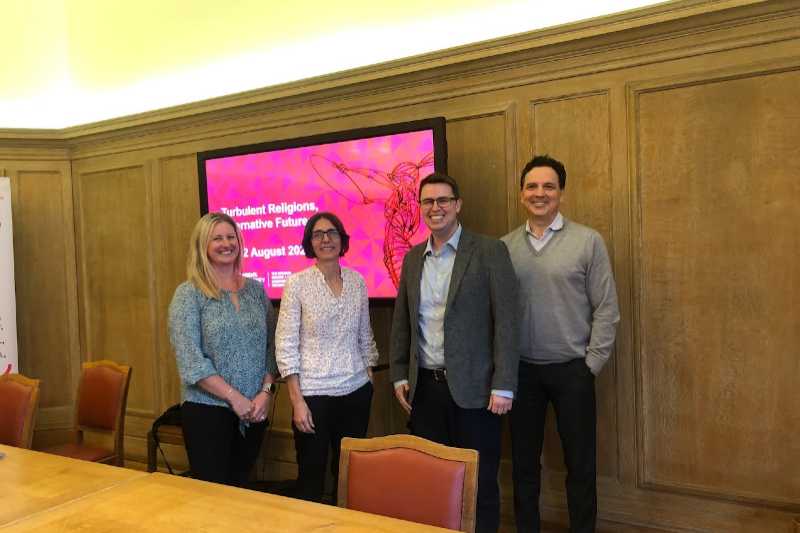
School of SSESW academic Gladys Ganiel (second left) collaborated on hosting Turbulent Religions, Alternative Futures, an international workshop at Queen’s University Belfast in August for scholars from Queen’s and from the University of Notre Dame, Indiana.
Contributors at the event shared expertise in ‘turbulent religions’ including the study of how religious actors, institutions and discourses can disrupt societies and politics, by contributing to violence or peacefully challenging injustices and inequalities.
Research by the Queen’s and Notre Dame colleagues analyses the significance and impact of religions in polarizing contexts, including the roles of religion in violence, peacebuilding and imagining alternative futures on the island of Ireland, Palestine/Israel and the United States.
Panel discussions explored the themes of: religion in relation to violence, polarisation, identity, environmentalism and sustainability; Zionism, pilgrimage and tourism; and religions – pasts and futures.
Participating in the workshop discussions were School of SSESW academics Veronique Altglas, Gladys Ganiel and Cathal McManus, along with academics from the wider Queen’s University and Notre Dame.
During their visit to Queen’s University, the Notre Dame delegation also visited the Corrymeela Community in Ballycastle, one of Ireland’s leading faith-based peace and reconciliation organisations supporting people from different backgrounds to live well together. The visit featured a guided tour about Corrymeela’s history and activities during the Troubles, and briefings on Corrymeela’s current work on anti-sectarianism and public theology.
The international event was co-ordinated by Professor Gladys Ganiel, through the Queen’s University Senator George J. Mitchell Institute for Global Peace, Security and Justice, and by Professor Atalia Omer, University of Notre Dame. An edited book or special edition journal will be produced based on the discussions at the workshop and scholars will pursue further collaboration on the research themes.

Karola Dillenburger, Centre Director, was invited as International Guest Faculty for the Applied Behaviour Analysis (ABA) programme at Asia Pacific ABA Network Institute in Japan and delivered two main lectures. The first focussed on ‘Function-based behaviour reduction: functional analysis to self-harm and severely inappropriate behaviour’ and the second addressed ‘Recent topics on ABA principles, interventions and ethics’.
Karola Dillenburger and Canadian colleague Genevieve Roy-Wsiak presented an address at the BestOfABA Congress, in Cagnes sur Mer, France entitled ‘What is ABA and how can I apply it? Developing impactful yet accessible technology for autism interventions’. They presented outcome data of surveys related to the SimpleStepsAutism training package.
Karola Dillenburger, with Ulster University colleague Professor Mickey Keenan, published Autism and Behavior Analysis: From Dissonance to Dialogue, a paper on the debate about Applied Behaviour Analysis. It suggests a way forward based on what are basically complementary views on the goals enshrined in rights-based practice.
Katerina Dounavi presented her research as a poster at the European Association for Research on Learning and Instruction 20th Biennial Conference in Thessaloniki, Greece. Her poster was entitled ‘Participative autism research: reaching social validity through the participatory research index’.
Katerina Dounavi and Meral Koldas presented at the School of SSESW Annual Conference a paper entitled ‘Parental wishes, needs and preferences around autism early life screening’. In their presentation they discussed parental attitudes around very early life detection of autism, with an emphasis on detection through genetic testing.
I am delighted to bring you our latest newsletter from the School of Social Sciences, Education and Social Work (SSESW) at Queen’s University Belfast.
Across our work in Criminology, Sociology, Social Policy, Education and Social Work we consistently strive to make a difference, be it through preparing our students to become high quality professionals and active citizens, or through our research making a positive difference to people, communities and policy in Northern Ireland and beyond.
This newsletter provides some recent highlights from our work across different areas in the School, and I hope this will spark your interest and imagination. We are keen to connect, and keen to hear from and work with you, so do get in touch if any of the work we report in this newsletter is of interest, or if there are any other areas you would like to connect with us on.
Professor Daniel Muijs
Head of School of Social Sciences, Education and Social Work
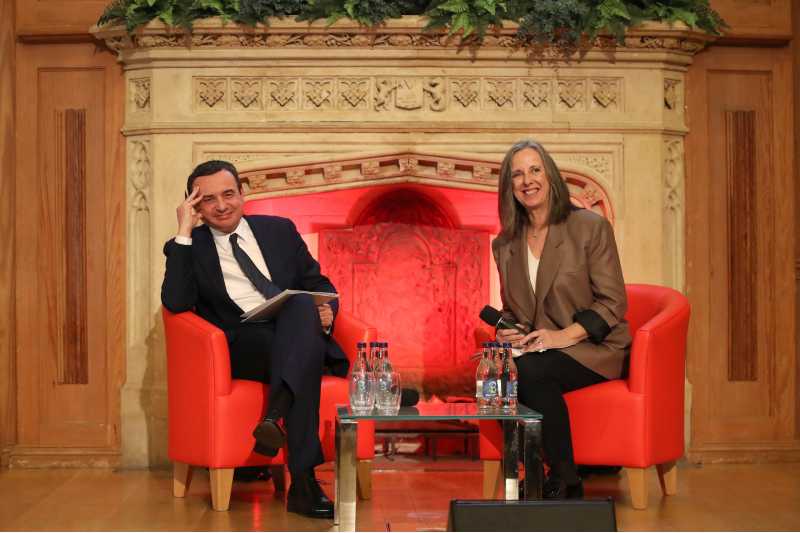
Our Centre for Shared Education (CSE) hosted the Prime Minister of Kosovo, Albin Kurti, on a visit to Northern Ireland in February. The Centre supports the development of initiatives in Kosovo based on the Northern Ireland Shared Education model, working with sectors in both jurisdictions, including academics, policy makers, school leaders, politicians and NGOs.
Mr Kurti visited a shared education partnership at Nettlefield and St Matthew’s primary schools in Belfast, talking with school children, teachers and principals about their experiences and the advantages of being in a shared education partnership.
Professor Joanne Hughes, CSE Director, said:
"Queen’s Centre for Shared Education has a long history of working with Kosovo colleagues to support their development of an adapted shared education model. We were delighted to meet Prime Minister Albin Kurti and his team, to showcase the shared education journey in Northern Ireland. We were especially pleased that our meeting took place at the Nettlefield/St Matthew’s site, so they could see the partnership that has developed between schools in one of the most divided interfaces in Belfast."
Dr Edona Maloku, former Deputy Minister of Education in Kosovo and a Fellow at CSE, funded by the Social Change Initiative, remarked:
“I was very proud to have the Prime Minister of Kosovo and our Kosovo team visit Northern Ireland to see the work being done here in peace-building. I am particularly vested in strengthening the partnerships between our two contexts so that a model of Shared Education is locally tailored and piloted in Kosovo. It is an initiative we have been working on for a while now with our Northern Ireland collaborators, so getting the Kosovo government team to talk to the stakeholders and see the partnering schools in practice was a big milestone in this direction. There is much to learn and exchange between our two countries."
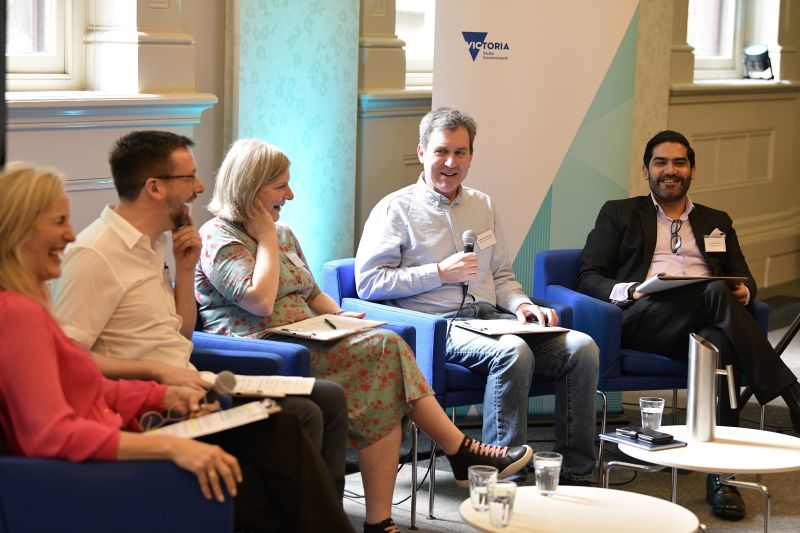
SSESW academic Gavin Davidson was part of a delegation of Northern Ireland mental health experts who spent time in Melbourne, Australia and Wellington, New Zealand earlier this year to learn from innovative and progressive service developments in both countries in order to inform mental health services planning and delivery in Northern Ireland. Gavin was accompanied by Dr Iain McDougall, Consultant Psychiatrist with the Belfast Trust and Dr Claire McCartan, Senior Researcher with the Regional Trauma Network and the Impact Research Centre (an inter-agency mental health research centre in the Northern Trust).
They were able to visits 23 organisations across the two cities and the key learning included: positive approaches to mental health data and outcomes; the extension of children and young people’s mental health services to age 25; the centrality of lived experience in all aspects of services including the workforce; the importance of trauma-informed care; holistic and culturally appropriate approaches to mental health; and the integration of research, and researchers, in services. The learning from the trip is being used in a number of ways including to inform the approach to data and outcomes being developed as part of the Northern Ireland Mental Health Strategy.
The trip brought opportunities to further develop relationships with key policy makers, researchers and practitioners in Australia and New Zealand and to enable ongoing knowledge exchange and collaboration. Three of the people visited by Gavin, Claire and Iain will be coming to Queen’s University this summer. Professor Darryl Maybery from Monash University was appointed as a Visiting Scholar with us in the School of SSESW and joined us in June. Two researchers from LaTrobe University in Melbourne, Tessa Zirnsak and Bianca Mandeville, joined SSESW in July.
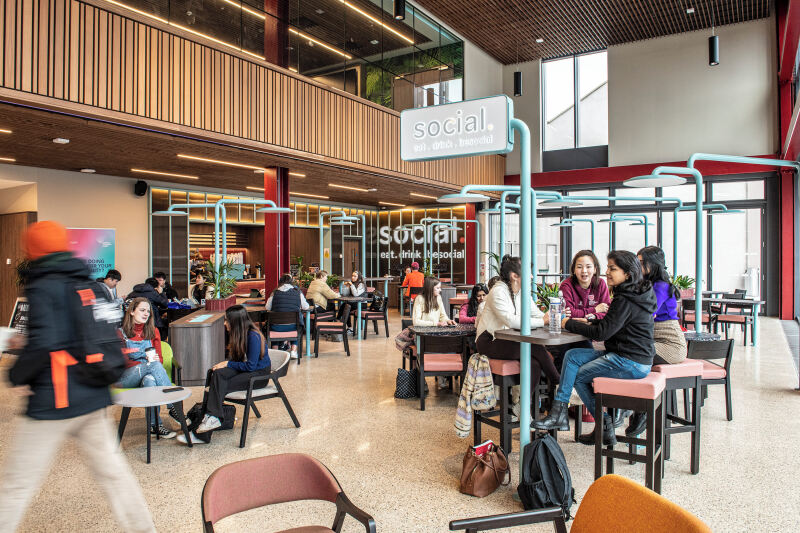
We are delighted to note a significant number of SSESW students being awarded Queen’s University opportunities to study abroad. The Global Mobility awards support students in Arts, Humanities and Social Science to undertake skills development activities around the world. Becoming a global citizen during their study enhances students’ skills, broadens their horizons and allows them to immerse themselves in culture, ideas and knowledge from the settings they aim to work in.
Nine students from across our BA programme (Social Policy, Criminology and Sociology) won scholarships to study abroad and spent three weeks in June at Belmont University, Nashville. They lived and studied on the Belmont campus, exploring the history of Nashville and the social and economic challenges that persist in the city.
Two undergraduates will spend a year abroad at Boston College and University of North Carolina, Wilmington. One of them was also successful in her application for a Clinton Scholarship, a fund established to give students opportunities to study in the USA and to develop their skills, networks and experience as global citizens. She will spend the final year of her Queen’s University Belfast degree in Criminology and Sociology studying at the University of North Carolina, Wilmington.
Two Postgraduate Certificate of Education (PGCE) students did a four week teaching practice in secondary schools in Spain in May as part of their PGCE. The students were successful in getting £1000 each from the AHSS Faculty’s JetSet award.
In June, seventeen PGCE students from the English and Modern Languages pathways went to Germany for a language, literature and culture trip. They visited schools in Berlin and Munich, giving them opportunities to reflect on their experiences of education in Northern Ireland and the curriculum they have been teaching during their placements. They took part in literature trails in Germany and examine the influence of place and space on literature.
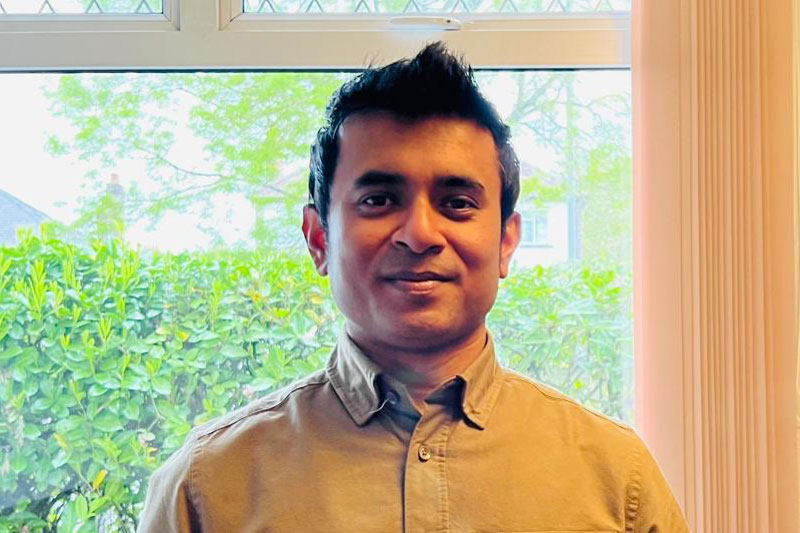
I am from Bangladesh and am a final year PhD student in Social Policy. My interests in exploring new culture and studying in a research-intensive university led me to join the PhD programme at Queen’s University Belfast in October 2020. It was difficult at the start due to COVID lockdown but, as restrictions eased, I have come to know so many students from around the world and have developed great networks and friendships.
Life in Belfast is quite exciting. The people are extraordinarily friendly and helpful. Within a short period of time, Northern Ireland became one of my favourite places to live. You can find world renowned, beautiful tourist destinations like the Giant's Causeway, Carrick-a-Rede Rope Bridge, Dunluce Castle and the Dark Hedges. All are made to feel welcome to come and try the delicious food and drinks of Belfast.
I am actively engaged with numerous activities at Queen's besides my study. In 2021-22, I was elected as Faculty Representative of the QUB Students' Union. My contribution to establishing the Inter-Cultural Exchange Community in Queen's was a milestone of my tenure. This academic year, I am working as a Student Skills Assistant in the School of SSESW, giving me opportunities to extend my support to undergraduate students in Social Work. The main objective is to provide them with a smooth academic journey by solving their difficulties in structuring their assignments, referencing, avoiding plagiarism and preparing for the exams.
Furthermore, my involvement in the Centre for Inclusion, Transformation and Equality as a Postgraduate Research Student coordinator, and engagement in many more on-campus activities, are giving me an excellent experience of academic life in the School of SSESW and Queen’s University as a whole.

SSESW colleague Gavin Davidson, Professor of Social Care, was instrumental in bringing the Early Intervention and Prevention Conference to Queen’s University in March as part of the Department of Health (DoH) Mental Health Strategy. Delegates heard that it is a priority for the DoH that cross-cutting government policies recognise their impact on public mental health and that statutory agencies and departments use their influence and resources to help prevent mental health problems. Tackling the underlying causes of poor mental health is key to achieving better outcomes for people living in Northern Ireland.
The issue has been brought into focus by data which show that approximately one in five people in Northern Ireland have a potential mental health problem.
The conference brought together policy makers, academics and professionals from statutory, voluntary and community sector organisations to focus on prevention and to consider the impact of their work on public mental health.
Keynote speakers included Lee Knifton, Director of Devolved Nations at the Mental Health Foundation, and Dr David McDaid, London School of Economics and Political Sciences, who works on mental health and public health in the UK, Europe and globally.
Aidan Dawson, Chief Executive at the Public Health Agency, which coordinated the conference, said:
"Improving the mental health of the people of Northern Ireland is a complex but very important issue, which is why we are keen to drive forward insightful and effective conversations around how this can best be achieved. By getting to the root causes of poor mental health, and taking collaborative steps to help address these issues at source, we can take significant steps forward in improving wellbeing in our communities. This conference brings together experts, policy makers and those on the frontline to challenge and debate how we can continually evolve what we do to drive down the prevalence of poor mental health here."

Dirk Schubotz (Social Policy) and Alison Mackenzie (Education) and their recently graduated PhD student Ruth Flanagan are part of an interdisciplinary team at Queen’s University Belfast that has joined the Academic Network for Sexual and Reproductive Health and Rights Policy — Ghent University (ANSER) which supports work on developing and improving global government policies around health, gender equality and reducing inequalities.
The Queen’s team is led by led by Maria Lohan in the School of Nursing & Midwifery (Professor of Social Science and Health, and UNESCO Chair in Gender Equality) and, in addition to School of SSESW colleagues, includes staff from the Schools of Nursing & Midwifery, Law, and History, Anthropology, Philosophy & Politics.
A number of SSESW doctoral students undertake research in the ANSER Network’s areas of interest around Sexual and Reproductive Health and Rights. These include third year PhD student Pinar Celik, whose study is focused on developing sex education tools to raise awareness on sexual abuse among primary school-aged children with special educational needs and disabilities, and first year PhD student Megan Turner who was awarded a collaborative PhD study scholarship. Megan is undertaking a Northern Ireland-wide study with Common Youth, Northern Ireland’s sexual health charity for young people, to explore sexual attitudes and sexual competencies with young people.
The ANSER Network will focus on a range of academic activities and engagements, aiming to develop interventions and educational tools with a practical use and tangible impact in society, to improve people’s sexual health, access to good quality sexual health services, relationship and sexuality education and to raise awareness of, and prevent, sexual and gender-based violence.
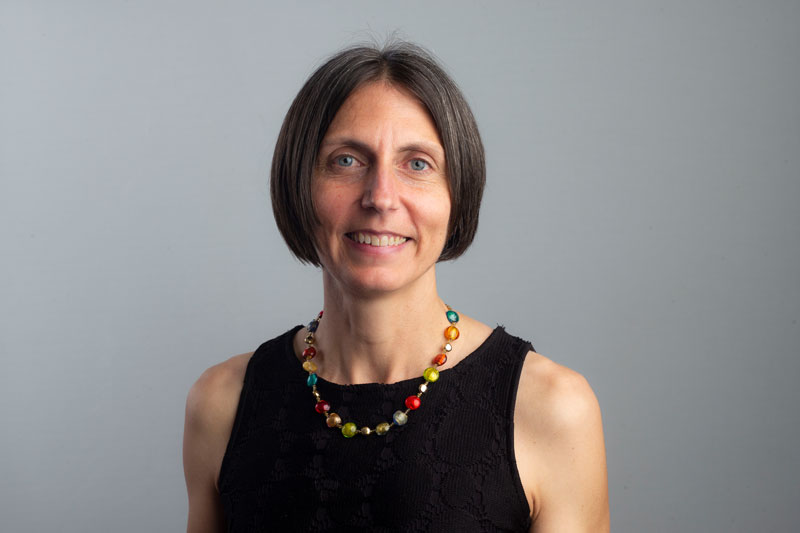
I am a sociologist of religion specializing in religion, conflict and peacebuilding in Northern Ireland, and religious trends on the island of Ireland. My undergraduate teaching includes modules on qualitative research skills and the sociology of conflict and peace processes. At graduate level, I teach religion and peacebuilding and qualitative research. My religion and peacebuilding module won the 2018 ‘Module of the Year’ award from the Students’ Union.
After completing a PhD in Politics at University College Dublin in 2005, I worked for nine years at the Belfast campus of Trinity College Dublin before moving to Queen’s University in 2015. I was elected to the Royal Irish Academy in 2022 in recognition of my achievements in research.
I am lead researcher on a multi-nation project on religion in societies emerging from Covid-19, comparing the island of Ireland, Canada, Germany and Poland. It focuses on: religious discourses around health, illness and science; relationships between religions and the state; and religious adaptations to the digital world. So far, we are finding that religions in these contexts were very supportive of government restrictions, with limited complaints about violations of religious freedom during the pandemic. In addition, after initial enthusiasm, religious groups have been more cautious about practising religion online.
I co-edited, with Queen’s historian Andrew Holmes, the Oxford Handbook of Religion in Modern Ireland, published in 2024. It has 32 chapters on a range of topics and time periods from 1800 to the present day. It engages with key debates on identity, secularization, everyday religion and gender.
My books on Northern Ireland include Considering Grace: Presbyterians and the Troubles, co-authored with Jamie Yohanis, which records the deeply moving stories of 120 ordinary people’s experiences of the Troubles, exploring how faith shaped their responses to violence and its aftermath. I also wrote Unity Pilgrim: The Life of Fr Gerry Reynolds CSsR, a popular biography of a priest based in Belfast’s Clonard Monastery during the Troubles. Fr Gerry played a key role during the peace process through his involvement in secret talks with paramilitaries and through his pioneering ecumenical projects.
I am a competitive runner and ran the marathon for Northern Ireland at the 2014 Commonwealth Games. I also ran for Ireland in the 2018 and 2016 European championships and won the 2022 Belfast Marathon.
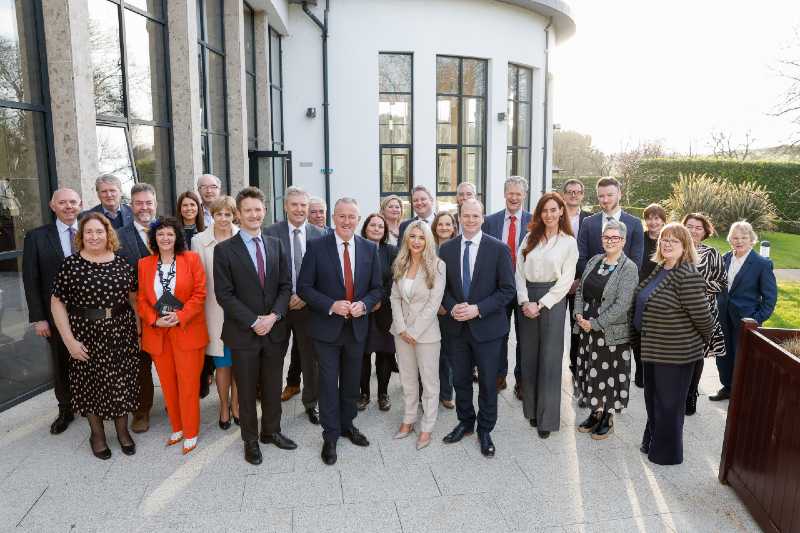
Paula Devine is Co-Investigator on a new £4.8m project to set up a research and policy action group to tackle economic inactivity, a key strategic challenge to the future economic and social prosperity of Northern Ireland. Led by Professor Kristel Miller (Ulster University), EPIC Futures NI brings together the Departments for Communities, Finance and Economy, academics from Ulster and Queen’s, including the School of SSESW and Queen’s Business School, plus community, education and business groups to inform policy change to support people back into work.
Northern Ireland has the highest economic inactivity rate across all UK regions at just under 26%. Unemployment rates are the lowest of any UK region, making it difficult for employers to fill vacancies. However, there are many people who are ‘hidden unemployed’, who would like to work but face barriers in doing so. This includes women, individuals with disabilities and people aged over 50.
The three-year Local Policy Innovation Partnership is funded by UK Research and Innovation. The project will facilitate further research into crucial areas including future skills needs, lifelong learning, labour market inclusion for vulnerable groups and regional balance. A key product will be a Labour Market Observatory, an online, freely available resource filling labour market data gaps in Northern Ireland and improving knowledge and intelligence about the region’s current and future skills needs.
Paula Devine commented: “The project is an exciting and important opportunity to bring a wide range of organisations together to help ensure the inclusion of everyone in the labour market.”
Follow EPIC Futures NI on X/Twitter @EPICFuturesNI.
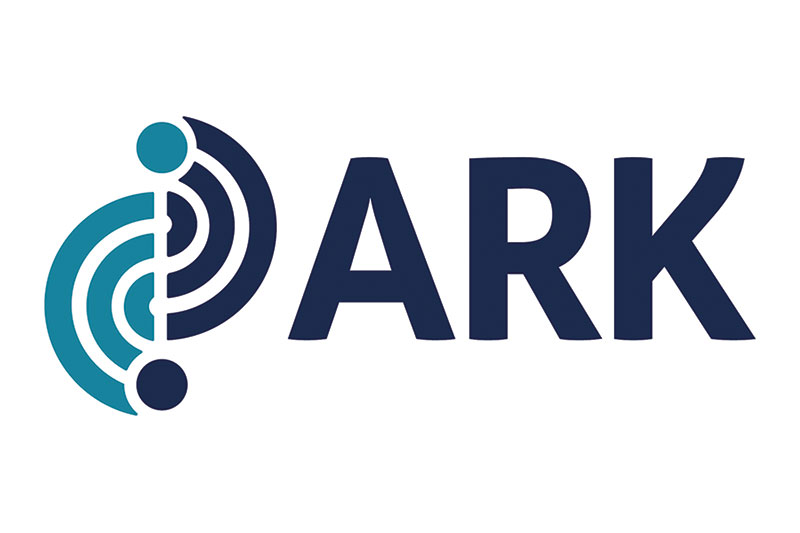
In November, ARK celebrated the 20th anniversary of the Young Life and Times (YLT) survey of 16 year olds. In 2003, YLT focused on community relations and education. Since then, it has covered a wide range of topics concerning young people's lives. It is now one of the main tools to inform policy making on and for young people in Northern Ireland. To mark the anniversary, we were delighted to welcome guest speaker Chris Quinn (Commissioner for Children and Young People) alongside well-known experts and researchers with whom we have worked over the last two decades.
In January, ARK hosted a lecture by Professor Catherine Needham (University of Birmingham) on Social Care in the Four Nations of the UK. Professor Needham discussed how crises in social care are portrayed differently across the four nations of the UK. A video of the event is available on the ARK website.
In March, ARK hosted Nirmali Goswami and Riniki Dutta from Tezpur University. Working with Gemma Carney, Nirmali and Riniki participated in a range of seminars and workshops. The visit was funded by a Department for the Economy Overseas Development Aid grant – Changing Generations of India: developing collaborative indigenous research methods to understand young lives in India. Nirmali and Gemma have been working as co-supervisors of Murchana Kaushik’s PhD which explores intergenerational transmission of political values in Assam.
Erin Early, Paula Devine, Dirk Schubotz and Minchen Liu met with the Northern Ireland Affairs Committee which visited Queen’s University in March as part of its inquiry into integrated education. The ARK researchers published a report in 2023 exploring methods to assess demand for integrated education.

Our Centre for Children’s Rights is leading a new, innovative project called RADICAL (Respect and Disrespect in Children’s and Adolescents’ Lives). The focus and design of the research were developed at the outset of the project with an advisory group of children and young people (CYP), a radical approach to research in itself. Despite CYP often being the focus of discussion, concern and censure around their lack of respect or needing to be taught respect, there is little research on conceptions of respect and disrespect that involve research with children.
The project seeks to address this gap by working directly with CYP to understand and theorise respect and disrespect in their everyday lives and to use this to inform policy and practice. The work is funded by the Economic and Social Research Council. Led by SSESW academic Siobhan McAlister (Criminology), it is a collaboration between Queen’s University Belfast, Ulster University and the University of Strathclyde.
Researchers are recruiting two advisory groups of children and young people to develop their own theories of respect and disrespect, which will guide the study, as well as to make decisions about what will be researched and how the research will be conducted, and to understand and communicate the findings. A variety of methods (questions in large annual population surveys of 11- and 16-year-olds, ‘dialogue hubs’ and narrative interviews) will be used to enable children and young people to develop a theory of respect, and to capture their views, attitudes and lived experience of respect/disrespect/lack of respect. The findings are expected to inform local government policy and professional practice with a view to generating improved relationships among CYP and their peers and the adults in their lives. For more information contact s.mcalister@qub.ac.uk
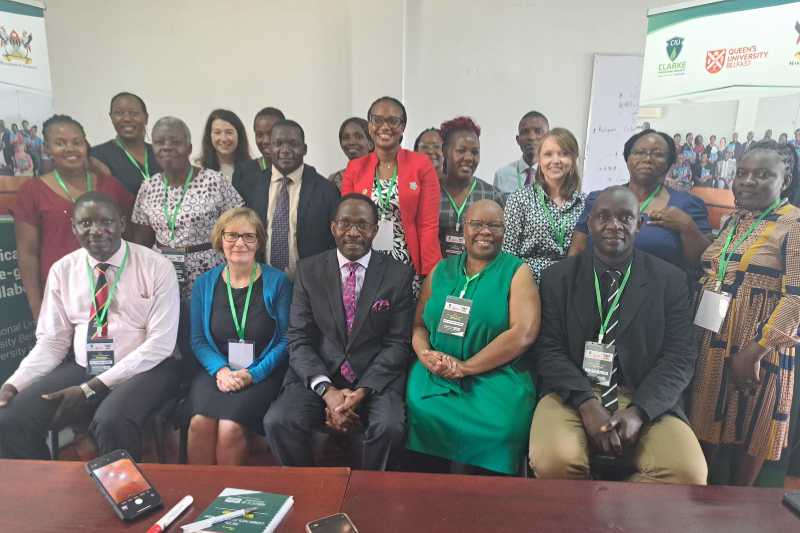
A Queen’s University team held a series of workshops in Kampala, Uganda, in March aimed at addressing the needs of the country’s millions of family carers and the economic burden they face. The workshops were part of an ongoing collaboration between the Queen’s colleagues and a Ugandan team of academics.
Lorna Montgomery and Danielle McIlroy, both Social Work academics in the School of SSESW, and Charlene McShane from Queen’s University Centre for Public Health worked with their Ugandan counterparts, led by Dr Cyprian Misinde, Makerere University, Kampala and Professor Rose Clarke Nanyonga, Clarke International University, Kampala.
As part of this collaborative partnership the team had previously explored the needs of the estimated 6 million family carers in Uganda, concluding that family-based care, in its present configuration, is unable to deliver good quality, sustainable, integrated care. The economic burden on carers has led to increased poverty, negatively impacting on the wider family, and in particular on women and children. Lack of attention and investment in family caregiving is undermining actions to achieve inclusive and sustainable development.
Previous studies conducted by the team also highlighted the need to develop resources to educate and support family carers. Interventions supporting carers in low-income contexts were found to be feasible, affordable and acceptable.
The workshops in March were funded by the Northern Ireland Department for the Economy. Key stakeholders met to further develop the family carers’ resources and to agree a framework for a ‘Uganda Caregiver’s Toolkit’, and processes through which the toolkit could be developed and integrated. The team also met with the Ugandan Ministry of Health to discuss and action the co-production of a family caregiver’s policy.
As part of the next stage for this collaboration, the team is seeking funding to further develop and test the resource.
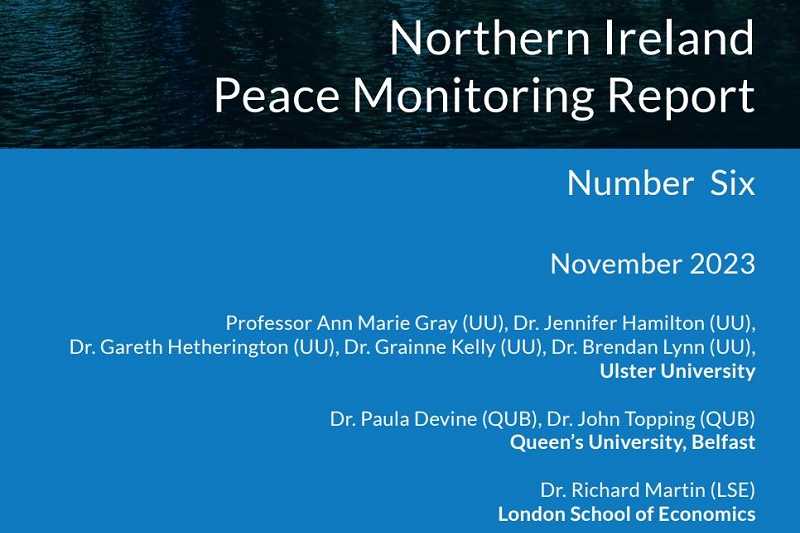
Paula Devine (Social Policy) and John Topping (Criminology) were part of a team that wrote the most recent Northern Ireland Peace Monitoring Report. The Peace Monitoring series provides a regular assessment of distance travelled, either closer to or further away from the shared goal of a peaceful and inclusive society.
Published in December 2023, the Sixth Peace Monitoring Report covers the period October 2018 to May 2023, and gathers and examines data on a wide range of topics. For some of these, such as political developments, the activities of paramilitary groups, policing and community relations, the link to peace is obvious. However, a sustainable peace requires tackling socio-economic inequalities as well as building a strong and productive economy and trust in political and other institutions. These issues are, therefore, also included in the report.
As in previous reports in the series, the report is based on four themes: political progress - how (or if) the political institutions set up under the Belfast/Good Friday Agreement are working; the sense of safety - covering safety in different contexts including the home; equality – including structural, economic and social equality, as well as progress on social policy; and cohesion and sharing – examining sharing and separation in education, housing and public space.
As we might expect, the impact of the COVID-19 pandemic is obvious throughout the report, as is the influence of the Belfast/Good Friday Agreement, especially given its 25th anniversary.
The team was led by Ann Marie Gray (Ulster University), and also included Jennifer Hamilton, Grainne Kelly, Brendan Lynn and Richard Johnson (Ulster University) and Richard Martin (London School of Economics). The project is run by the Community Relations Council. It was financially supported by the Joseph Rowntree Charitable Trust.
The Peace Monitoring Report is available on the ARK website.
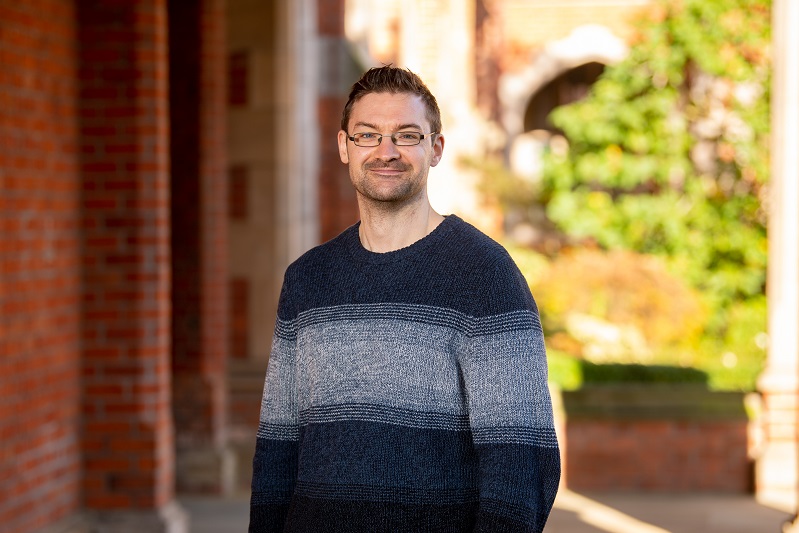
I stumbled into academia through happenstance, last-minute applications and generally following the path of least resistance. I did my undergraduate degree in Law & Government at the University of Ulster (UU), not because I wanted to become a lawyer but more because it seemed like a ‘good’ degree to have. With career prospects severely limited by the global economic crisis of the time, I applied (last-minute) to do an LLM in Human Rights Law & Transitional Justice at UU before applying (again last-minute) to do a PhD at UU.
From 2015-2017 I was a post-doctoral research fellow at the Criminal Justice Centre and Centre for Operational Policing Research at the University of Warwick, before taking up successive post-doctoral roles in the School of Law and the Institute for Global Peace, Security and Justice at Queen’s University Belfast. I took up my current role as lecturer in Criminology in the School of SSESW in September 2021.
My primary research interests are in the area of transitional justice, with my published work covering post-conflict police reform, truth recovery, memorialisation and debates around victimhood. More recently, I’ve developed an interest in narrative criminology/victimology and the use of memoirs in understanding lived experience of conflict, harm and victimisation. This has been useful in getting students on our Exploring Harm & Victimisation and Criminological Theory modules that I currently convene and teach on to think critically about structures of exclusion, the voices that we don’t hear from in mainstream discourse and different conceptualisations of harm and victimhood.
I have also been lucky enough to see my research make some real-world impact in the lives of those impacted by victimisation and harm. For example, my work with colleagues in Queen's University School of Law on compensation for conflict-related bereavement has proven useful to the Commission for Victims & Survivors for Northern Ireland, while other aspects of this research have been drawn on by international NGOs like REDRESS and the International Centre for Transitional Justice.
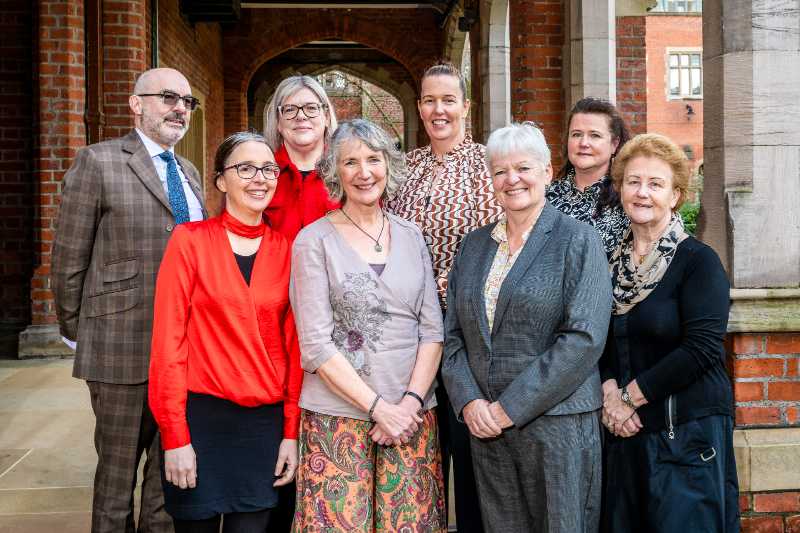
New research by Suzanne Mooney, Montserrat Fargas-Malet and colleagues in the School of SSESW and the School of Nursing & Midwifery calls for a trauma informed approach across organisations and services in Northern Ireland. It found that such approaches have the potential to improve outcomes for service users and their families, including better relationships with providers and timely access to the right support.
The research was commissioned by the Safeguarding Board for Northern Ireland (SBNI), with funding from the cross-Executive Programme on Paramilitarism and Organised Crime. The SBNI has been supporting organisations to become trauma informed since 2018 and commissioned the research to gauge progress. The research also identified potential benefits for staff and organisations, including increased job satisfaction and reduced staff sickness and turnover, leading to cost savings in the longer-term.
The resulting report, ‘We are on a Journey: Implementing Trauma Informed Approaches in Northern Ireland’, recommends governmental commitment through a trauma informed strategy for Northern Ireland. The authors recommend establishing a regional Trauma Informed Approach resource centre or hub and a trauma-related training framework promoting best practice consistency across services and settings.
Bernie McNally, Safeguarding Board, said:
"Early adversity and trauma can negatively impact on individuals and communities. We all deserve to live in a society that prioritises trauma responsive environments, policies, systems and services, that can benefit local people and communities."
The research included an international literature review, online survey, focus groups and case studies from Fane Street Primary School, the Salvation Army Thorndale Parenting Service, Youth Justice Agency, and Belfast Trust Health Inclusion Service for homeless people.
Suzanne Mooney said:
"Trauma informed approaches were universally perceived as having ‘no downsides’. They provide many benefits for service users and their family/network, but also for staff and service providers. These are critical issues in light of workforce recruitment and retention challenges across Northern Ireland."
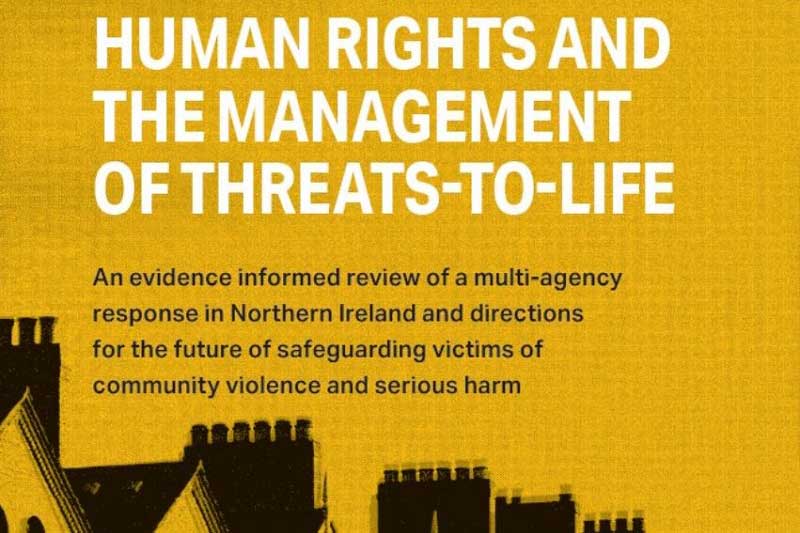
A report by SSESW academic Colm Walsh has highlighted the need for greater collaborative working and a public health focus to tackle paramilitary threats and intimidation in Northern Ireland. Despite being 25 years since the Good Friday Agreement, paramilitary activity and threats to life continue to impact victims and communities across Northern Ireland.
The current system for handling threats to life is managed by the Police Service of Northern Ireland (PSNI) and it was found that the current practice of issuing warning letters often leaves victims traumatized and feeling abandoned. The report found that this process could benefit from a more consistent approach.
The report notes that current issues around community trust in policing and the impact of ongoing paramilitary intimidation in communities have had an impact in reporting threats and accessing essential services.
Proposed options include reforming PSNI guidance on threats to life, extending coordination protocols to 'at risk' adults, formulating minimum standards for data collection and establishing a centralised process for the threat management process.
The report suggests that a greater focus on partnership working and a public health approach (which involves early intervention and co-operation across professional sectors), aligned with a review of guidance for those deemed ‘at risk’ and a greater focus on data analysis and accountability mechanisms, will help to improve support for victims and increase community confidence in policing.
The report, entitled ‘Human Rights and the Management of Threats to Life’, was funded by the Executive Programme on Paramilitarism, Criminality and Organised Crime and can be accessed on the Ending the Harm website.
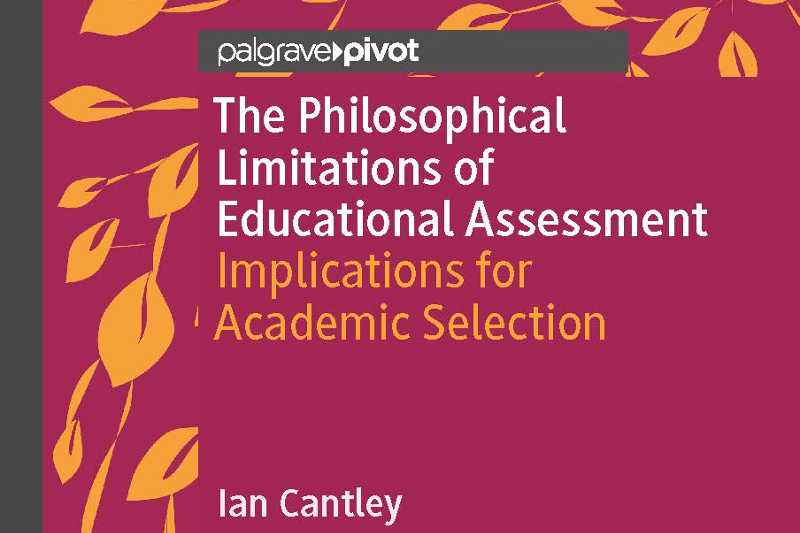
SSESW academic Ian Cantley has published a new book which uses philosophical analysis to argue that there are tensions associated with using the results of high stakes tests to predict students’ future potential. The implications of these issues for the interpretation of test scores in general are then analysed in the book and expanded upon before their connotations for academic selection are considered.
The Philosophical Limitations of Educational Assessment: Implications for Academic Selection offers a brief overview of the history of academic selection in the United Kingdom, and a review of evidence relating to its consequences. The book argues that the practice of using the results of contemporary high stakes tests to make important decisions about students involves logical and moral dilemmas that a conscientious educator cannot ignore. Furthermore, it is suggested that the nature of the moral dilemmas depends on the purpose and significance of the test. In the case of high stakes tests used for academic selection purposes, the book argues that, not only can the moral wrong be highly significant, but better solutions are within reach.
The Philosophical Limitations of Educational Assessment: Implications for Academic Selection (from Palgrave Macmillan) has received positive peer reviews, including one from Professor Alex Lautensach, University of Northern British Columbia, Canada:
“The book presents a convincing argument that high-stakes academic testing measures the wrong attributes and, on the whole, does more harm than good, especially in the context of academic selection. It places the onus on educators and on wider society to come up with better alternatives. The book is well researched, concise, to the point and extremely relevant to educators, caregivers, and school system administrators everywhere.”
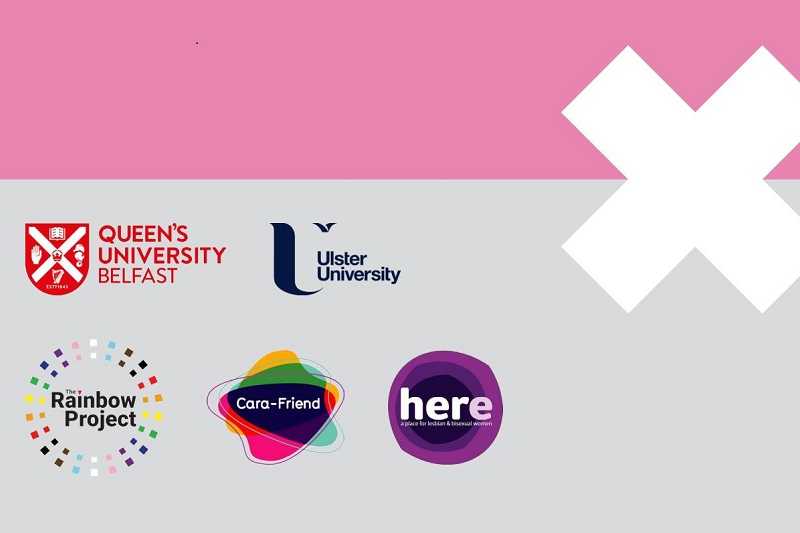
A new research report by SSESW academic Dr Danielle Mackle and Professor Fidelma Ashe (Ulster University) explored aspects of conversion practices in the Northern Ireland context, specifically why, how and where these practices happen, who experiences them and their effects on LGBTQI+ people. The Conversion Practices in Northern Ireland report recommends bringing forward legislation to legally ban conversion practices in Northern Ireland.
Conversion practices (also known as conversion therapies, reparative therapies, and cure therapies) encompass all medical, psychological, religious, cultural or any other interventions that seek to erase, repress or change a person’s sexual orientation and/or gender identity. Integral to these practices is the assumption or belief that LGBTQI+ identities are damaging, sinful or the result of a ‘medical dysfunction’ that can be cured.
This research was commissioned by LGBTQ+ sector organisations Cara-Friend, HEReNI, The Rainbow Project and TransgenderNI and was supported by funding from the Department for Communities to develop an understanding of conversion practices in Northern Ireland. The research study found that they were advertised publicly, or conversely, performed in a clandestine way. Participants identified a range of harm caused by participation in conversion practices, reflecting findings similar to those of cross-country studies of such practices.
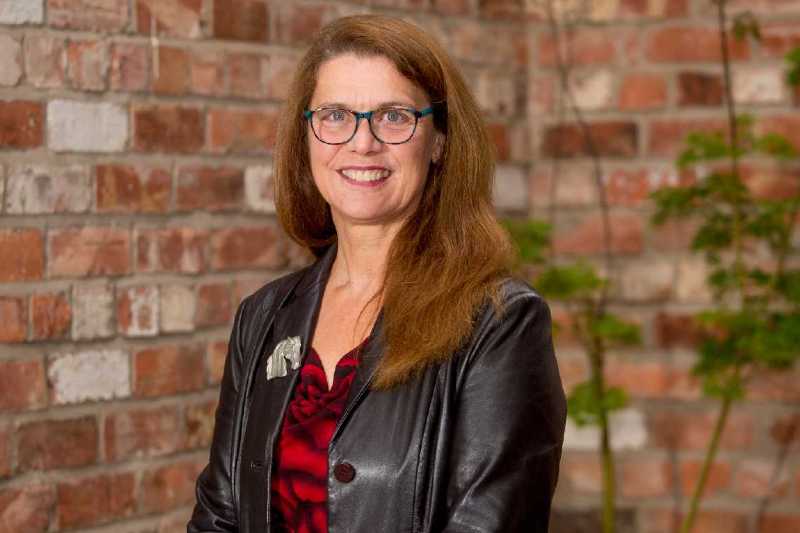
Karola Dillenburger, Director of our Centre for Behaviour Analysis, was awarded the Gold Medal of Masaryk University (MUNI) for her contribution to setting up autism services in the Czech Republic. Karola is renowned for her autism advocacy and high-impact research. In the Czech Republic she led developments for training and professional recognition of behaviour analysts and evidence-based autism service, including the Czech Association of Behaviour Analysis and the Centre for Applied Behaviour Analysis at MUNI.
The prestigious Gold Medal award is bestowed on distinguished representatives from the world of science, culture, higher education and public life in recognition of their outstanding contributions, including their commitment to the struggle for human rights and dignity. The Gold Medal was presented by the Rector of MUNI, Professor Martin Béreš during their 105th anniversary celebrations at MUNI earlier this year.
Karola said about her Masaryk University award: "Receiving this international recognition for my work in relation to bringing the science of behaviour analysis to the community in the Czech Republic means the world to me. I have been working with my colleagues in the Czech Republic since the mother of a child with profound autism contacted me asking for help. Our team of parents, autistic adults, academics, politicians and professionals work together to enhance the lives of autistic children and adults. I feel that I received this award in the name of the whole team.”
Professor Sir Ian Greer, President and Vice-Chancellor of Queen’s University, commented: “I warmly congratulate Professor Dillenburger on her well-deserved recognition for her remarkable achievement in advancing autism services in the Czech Republic. Her unwavering commitment and impactful research have brought about positive change, enriching the lives of autistic individuals and their families throughout the world.”
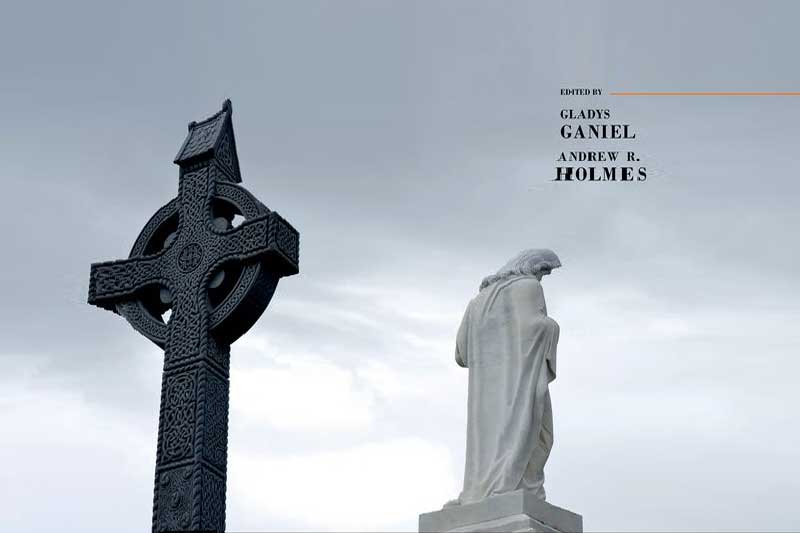
Sociology academic Gladys Ganiel is co-editor of a new landmark publication, the first volume to offer such a comprehensive and wide-ranging treatment of the role of religion on the island of Ireland between 1800 and the present day. The Oxford Handbook of Religion in Modern Ireland features 32 chapters exploring the relationships between religion, society, politics and everyday life.
Taking a chronological and all-island approach, the Handbook explores the complex and changing roles of religion both before and after partition. It includes fresh perspectives on long-standing historical and political debates about religion, identity and politics, including religion's contributions to division and violence. It also features contributions on how religion interacts with education, the media, law, gender and sexuality, science, literature, minority religions and memory.
The Oxford Handbook of Religion in Modern Ireland, edited by Gladys Ganiel (School of SSESW) and Andrew R. Holmes (School of HAPP) is available from Oxford University Press.
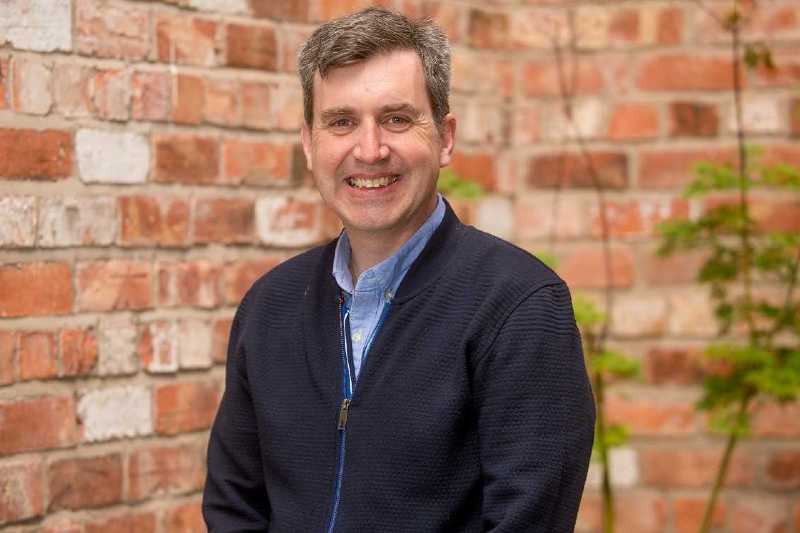
Gavin Davidson delivered his inaugural lecture, as Praxis Chair of Social Care, at the Praxis Care Research Conference at Queen’s University in November. The conference focus was on research to inform further development of services that effectively and safely meet the complex needs of people who have co-occurring mental health problems, learning disabilities and/or autism.
After qualifying as a social worker in 1995 Gavin worked for 12 years in mental health services, in the Northern Health and Social Care Trust, as a Community Mental Health Team social worker, out of hours Approved Social Worker, project manager and team leader in assertive outreach and rehabilitation. His research interests are in the area of mental health, specifically: the effectiveness of mental health services; the social determinants of mental health; human rights and mental health/mental capacity legislation; and the associations between adverse childhood experiences and mental health. Gavin moved to Queen’s University in 2008.
In his inaugural lecture, Gavin focused on the importance of human rights and social justice in the areas of law, policy and practice around complex needs. He also highlighted the benefits of working with Praxis Care as a research partner in order to inform change and promote positive outcomes for service users and carers.
At the Praxis conference, a combination of international and Northern Ireland based research was presented to an engaged audience of policy makers, service providers, service users, carers and researchers. The event was supported by the School of SSESW, Praxis and the Research and Development Division of the Public Health Agency.
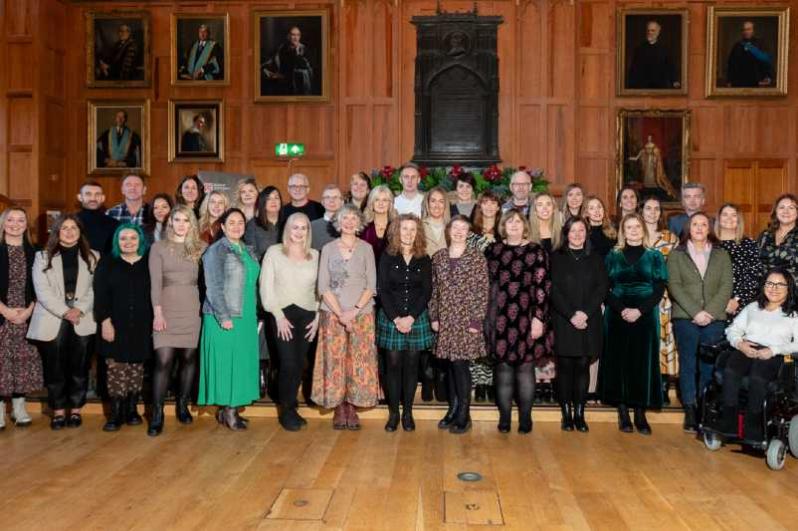
Academics and tutors from our postgraduate programmes in Social Work were delighted to welcome graduates to an event on the Queen’s University campus in January where the students were presented with their parchments for completed certificates and diplomas in areas including Substance Use, Mental Health, and Systemic Practice and Family Therapy.
Students and staff heard from guest speaker Aine Morrison, Chief Social Worker in the Department of Health, and were joined by Gillian McAuley representing the Northern Ireland Social Care Council.
Most of Aine Morrison’s career has been spent in learning disability services for children and adults and she also practiced as an Approved Social Worker so she had plenty of encouraging words to mark students’ dedication to their professions by investing in improving their professional practice through completion of their School of SSESW programmes.
The School offers a suite of Postgraduate Pathways in healthcare topics.
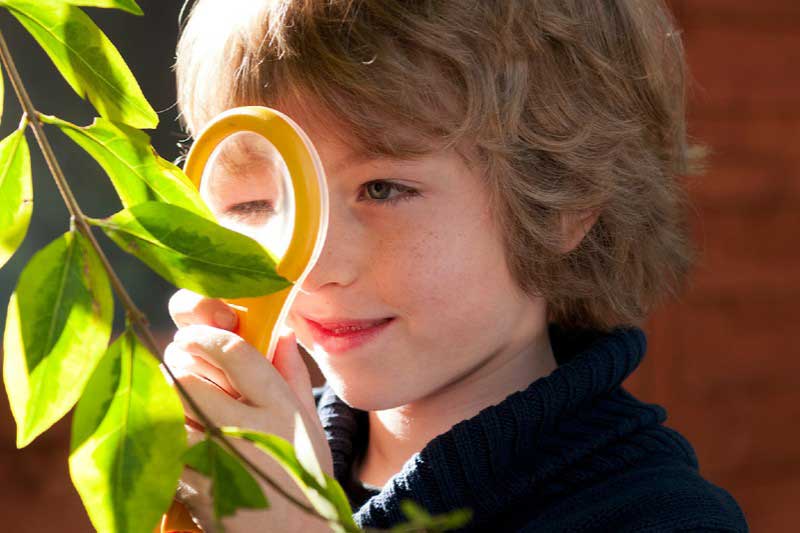
Global mobility for students: MSc Applied Behaviour Analysis students Cynthia Gouveia Caria, Chloe Allison and Emily Heslop visited Brno and Prague, Czech Republic. The visit was organised by Centre colleague Katerina Dounavi, with Professor Karel Pančocha, Head of the Centre for Applied Behaviour Analysis at the Institute of Research and in Inclusive Education at Masaryk University, and leading Czech autism centres.
The project Act on Early Life Autism Signs (Act-ELAS), led by Katerina Dounavi with Meral Koldas and funded through an ESRC Impact Acceleration Account, saw more than 1,000 parents and professionals take part in a range of on-site and virtual dissemination events held in Belfast, Thessaloniki (Greece), and online in English, Turkish and Greek.
Katerina Dounavi and Meral Koldas presented a poster entitled Parental perspectives around autism early life screening and genetic testing at the Association for Behavior Analysis International 18th Annual Autism Conference, Las Vegas, Nevada. Their paper was published in the Journal of Autism and Developmental Disorders.
The Centre for Behaviour Analysis webinar series welcomed Dr Paulie Gavoni, a distinguished American behaviour analyst and best-selling author. He reported on Organizational Behaviour Management as a means of creating meaningful behaviour change, closing gaps in staff performance, improving retention and ultimately increasing learner achievement.
World Behaviour Analysis Day (WBAD) on 20 March was established to support the spread of accurate information about the applications of behaviour analysis. To celebrate WBAD, the Centre for Behaviour Analysis hosted a webinar with Zuzanne Maštenová, who shared her expertise about countries where Applied Behaviour Analysis-based interventions are not funded.

Siobhán McAlister organised a partnership event in February with Corrymeela on Safeguarding in the 21st Century: Contextual Safeguarding and Child Criminal Exploitation Policy Developments in Northern Ireland with keynote from Professor Carlene Firmin (Durham University) and policy updates from the Department of Health and the Department of Justice.
In February, our Honorary Professor of Practice, Koulla Yiasouma, presented on Best Interests, Children’s Rights and Youth Justice: The Impossible Dream while Dr Sarah-Jane Conrad (University of Berne) spoke on Children’s Moral Concept of Privacy.
Mark Linden was guest speaker at Yonsei University, College of Nursing, South Korea. He spoke on Developing Interventions to Support Carers and Children with Intellectual Disabilities.
Laura Lundy was the guest speaker at an event in March in the Faculty of Law, University of Cambridge. She spoke about the Lundy Model of Child Participation which has been used by Dr Jan Ewing and Professor Anne Barlow to frame their research on Child Inclusive Mediation.
Paul McCafferty hosted an online seminar in March as part of his European Children's Rights in Practice Special Interest Group. The presentation was entitled Residential Child Care, Rights and Identity Formation for Looked After Children. The speaker was School of SSESW colleague and Centre member Gerry Marshall.
Bronagh Byrne was keynote speaker at the Annual European Federation of Associations of Teachers of the Deaf Congress in April. She spoke on The State of Deaf Children’s Rights and Responsibilities.
Dr Cadhla O’Sullivan, Children’s Policy Centre, Australian National University, Canberra, and Queen’s alumna presented on understanding, accessing and responding to poverty from a child standpoint.
In May, the Centre hosted Judge Anthony Fitzgerald, a New Zealand District Court Judge with a Youth Court designation and a Family Court warrant. Judge Fitzgerald presented on children’s rights-based approaches to judicial proceedings.

A series of three hard-hitting short films highlighting the harm caused by paramilitaries has been created by the Northern Ireland Executive’s Programme on Paramilitarism and Organised Crime (EPPOC) based on detailed insight and research from SSESW academic Colm Walsh, as commissioned by EPPOC. They provide insight into how today’s paramilitary gangs intimidate, control and coerce individuals and communities.
Adele Brown, EPPOC, said:
"Evidence shows paramilitarism continues to affect up to 40% of adults and 45% of young people in Northern Ireland and in some areas these figures can be almost double. Preliminary research estimates this costs Northern Ireland at least £0.5bn a year. EPPOC invests in over 100 community, voluntary and public sector projects, aiming to create safer communities more resilient to paramilitarism, criminality and coercive control. It funds activities designed to break the cycle of paramilitary harm in communities. Our EA Connect Programme reduced young people’s intent to engage in violence from 43% to 3%. We understand that a sustained and collaborative approach can make a difference."
SSESW academic Colm Walsh said:
"The Troubles normalised violence in communities, making them a breeding ground for paramilitaries and criminals to operate in. We are getting to grips with the hidden harms caused by these gangs such as child criminal exploitation, abuse of women, coercive control, economic crime, extortion, and gatekeeping."
My research revealed examples of young people being groomed over a prolonged period, taking increasingly dangerous risks to undertake more serious crimes. Young people described violence, intimidation, extortion, property damage and the concealment of weapons. The study revealed significant overlap between Child Sexual Exploitation and Child Criminal Exploitation, with young people at risk of being exploited in different ways within criminal and non-criminal networks. The research also revealed that very often victims do not realise they are being manipulated and exploited."
Welcome to the latest newsletter from the School of Social Sciences, Education and Social Work (SSESW) at Queen’s University Belfast. We strive to make a difference, be it through preparing SSESW students to become high quality professionals and active citizens, or through our research making a positive difference to people, communities and policy in Northern Ireland and beyond. The newsletter provides some recent highlights from our work across the School. We are keen to hear from and work with you so do get in touch if you are interested in our activities across Criminology, Sociology, Social Policy, Education and Social Work.
Professor Daniel Muijs
Head of School of Social Sciences, Education and Social Work

In September, the Northern Ireland Executive launched its new draft Programme for Government. One of the eight key priorities identified is ending violence against women and girls. Research conducted by our ARK team has been key to informing this Strategic Framework. ARK is Northern Ireland’s social policy hub hosted jointly by Queen’s University Belfast and Ulster University. Its primary goal is to increase the accessibility and use of academic data and research.
Since 2022, through its annual Northern Ireland Life and Times and Young Life and Times surveys, ARK has collected data on gender-based violence among representative samples of adults and 16 year olds in Northern Ireland. Alongside information collected from other stakeholders, such as the Police Service of Northern Ireland, and the women’s, youth and education sectors, ARK’s social attitude data has helped to develop key policy indicators that form the basis of the Strategic Framework.
The surveys asked respondents about their experiences of online and face-to-face violence, and barriers to reporting gender-based violence, as well as attitudes towards violence and bystander behaviour. We found, for example, that 75% of all 16 year old girls had experienced street harassment, whilst over half of girls had received unwanted texts of videos containing sexual content. One in five 16 year old boys did not think there was anything wrong with making sexist jokes, cat-calling or posting nasty sexual messages on social media.
More detailed results on gender-based violence can be found on the ARK website.
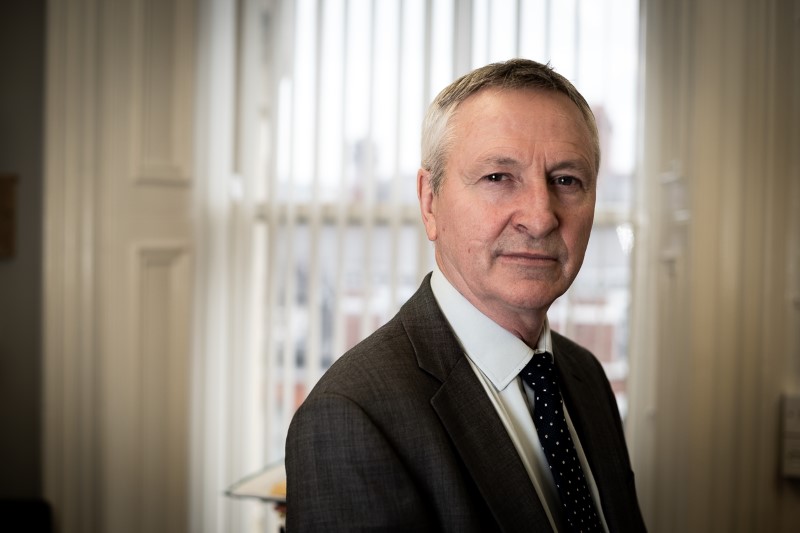
I started in professional practice as a mental health social worker in north Belfast during The Troubles, later training in psychotherapy and specialising in cognitive therapy. Many clients were victims of the conflict and we had few effective treatments for Post Traumatic Stress Disorder (PTSD) and trauma- related conditions. Since then, I have been researching PTSD, going on to join Queen’s University in 2009 as Director of the Cognitive Behaviour Therapy programme.
I redesigned the courses to reflect current evidence-based models and secured accreditation with the British Association for Behavioural and Cognitive Psychotherapy.
Our courses are highly valued and commissioned for all Northern Ireland Health and Social Care Trusts and the Health Service Executive regions in the Republic of Ireland. I am particularly proud that we are training Research Clinicians on our specialist trauma focussed MSc and many are now therapists in our complex PTSD trial.
My studies have been recognised internationally. I have been invited to provide many workshops after large scale traumas including: the 9/11 New York attack in 2001; the 7/11 London bombings in 2005; the Oslo bombing and Utoya Island shootings in 2012; and the Manchester Concert bomb in 2017. Some of my most influential work has been providing expert commentary in television documentaries screened on the BBC, BBC Persia and Channel 4.
In 2022, with Oxford University colleagues, as Principial Investigator I commenced a multi-site randomised control test (RCT) to test Trauma Focussed Cognitive Therapy for Complex PTSD, funded by a £2 million grant from the National Institute for Health and Care Research. Our group is also developing a new cognitive model for Prolonged Grief Disorder.
In 2022, with Queen’s University colleague Ciaran Mulholland, I designed a mental health assessment framework for the new Troubles Pension scheme which has now received over 10,000 applications.
It is important to disseminate our research and knowledge. Thus, I have been a member of the UK Trauma Council since its formation in 2020 and in January 2024 I accepted an invitation to join the Mental Health Advisory Panel of the National Emergencies Trust. My current international activities include: training mental health clinicians in Ukraine; providing expertise to colleagues at the North-West University, South Africa, for a psycho-social therapeutic programme for police officers; providing expert advice to colleagues at Curtin University in Australia for an RCT testing internet delivered cognitive behaviour therapy for adolescent grief.
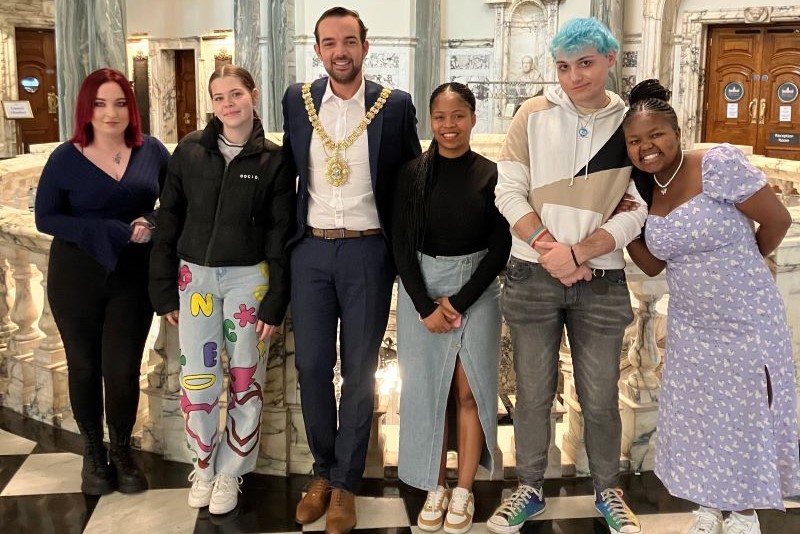
The School of Social Sciences Education and Social Work (SSESW) welcomed care-experienced young people from Cape Town to Belfast for a week of networking activities and participatory filmmaking as part of a project connecting care-experienced youth in Northern Ireland and South Africa, and their advocacy organisations, with social work and film academics and policy makers.
The project is led by SSESW professors Mandi MacDonald and Berni Kelly. The visit saw young people and staff from Mamelani Projects, Cape Town meet with their Northern Irish peers at Voice of Young People in Care (VOYPIC) to explore similarities and differences in their experiences of leaving care and to identify advocacy strategies. The group spent the week meeting policy influencers including the Lord Mayor of Belfast and the Northern Ireland Commissioner for Children and Young People (NICCY), learning about supports for young people leaving care – and, of course, introducing our visitors to Northern Irish food, culture and weather.
With the help of Queen’s colleagues, professors Cahal McLaughlin and Pedro Rebelo, the group are making a film and soundscape reflecting their shared and diverse perspectives on leaving care. Together they are building skills and connections for advocacy, equipping care-experienced youth to spotlight their priorities for research and action.
The young leaders from VOYPIC in Belfast and Mamelani Projects in Cape Town received a very warm welcome during the programme of activities, including from the Lord Mayor of Belfast Councillor Murray, Queen’s University colleagues, VOYPIC, NICCY and the staff and local politicians at the Northern Ireland Assembly at Stormont.
The project is funded by AHRC and ESRC Impact Acceleration Accounts at Queen’s University Belfast and is a collaboration with the Children’s Institute at the University of Cape Town. For more information, you can email Professor Mandi MacDonald at m.macdonald@qub.ac.uk.
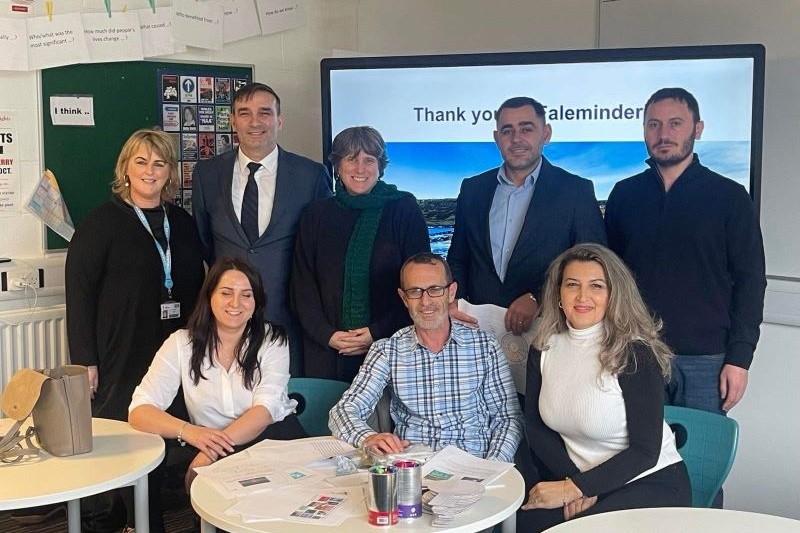
A group of education officials and teachers from Kosovo visited our Centre for Shared Education (CSE) in January to extend their knowledge and understanding of peacebuilding efforts through education in Northern Ireland and to explore the potential for adapting it within the Kosovan context.
The Kosovan visitors (pictured) participated in a three-day workshop while in Northern Ireland, a collaboration between CSE, the British Council and Ulster University and supported by the Mayor of Kamenica (Kosovo) and the Kosovan Prime Miniter’s Office. The group heard from academics in CSE and Ulster and met with educators and Education Authority officials during a visit to the Ballycastle Shared Education Campus. They also had the opportunity to attend the History of the Troubles exhibition at the Ulster Museum. The visit builds upon a long-standing collaboration between educators in Kosovo and CSE. Follow-up activity is intended to initiate a first shared education school-based project between Albanian and Serb schools in the municipality of Kamenica.
Also in January, a group of academics and postgraduate students from Hanze University of Applied Sciences, Groningen met with colleagues and a student from CSE in January to explore issues relating to the education system in Northern Ireland, social justice in education, and the role of education in divided societies. The visit was organised through the Northern Ireland Council for Integrated Education and the group also met with CSE associates in the School of Psychology at Queen’s University and with colleagues in Stranmillis University College, Belfast.
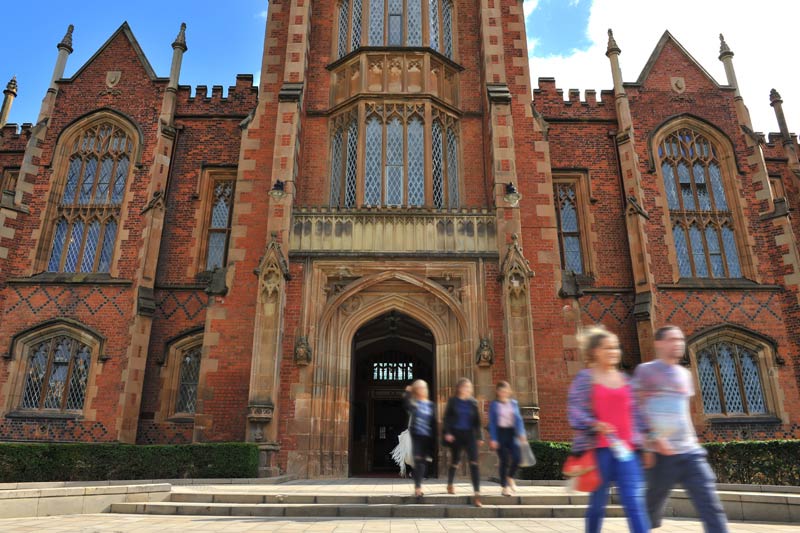
An article entitled ‘Plugging the Gap: Shared education and the promotion of community relations through schools in Northern Ireland’, by SSESW colleagues Joanne Hughes and Rebecca Loader, has been named as one of 10 ‘landmark studies’ in educational research over the past 10 years by the British Educational Research Association (BERA).
The article has been included in BERA’s 50@50 report which charts half a century of educational research through 50 studies that “have had a significant impact on educational policy, educational practice, research methodology and/or educational theory”. The article can be read or downloaded from the British Educational Research Journal.
Professor Joanne Hughes, Director of our Centre for Shared Education, commented on the BERA recognition:
“We are proud to represent Queen's University in the final selection, which includes publications from world-leading education researchers. Our paper reviewed efforts to promote social cohesion through education in Northern Ireland since the outbreak of conflict. It focused on the establishment of shared education as a curriculum-based effort that could bridge the gap that existed between short-term contact initiatives within separate schools and fully integrated education.”
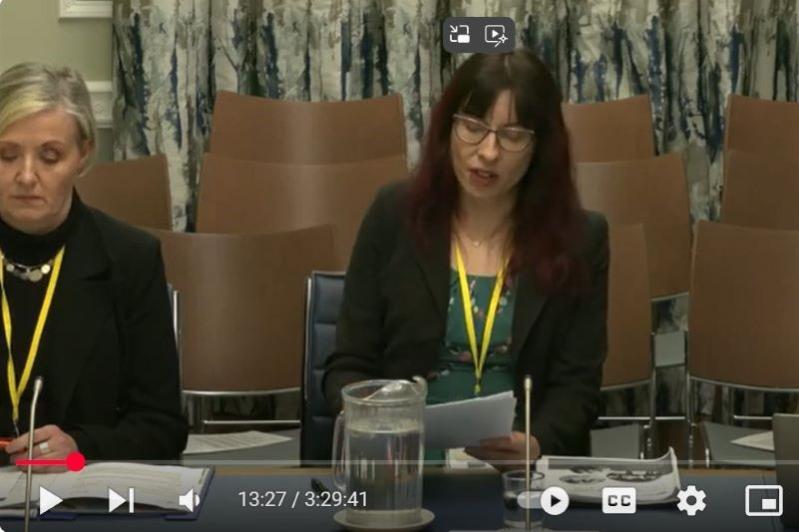
In December 2024, Rebecca Loader, Joanne Hughes and Aisling O’Boyle appeared before the Northern Ireland Assembly Education Committee to provide an oral briefing on their research on experiences of education among minority ethnic groups in Northern Ireland. Drawing on a two year research study funded by the Nuffield Foundation, the briefing and questions covered topics including school admissions, language education, the curriculum, and responses to racism at school. The full evidence session is available to view on YouTube.
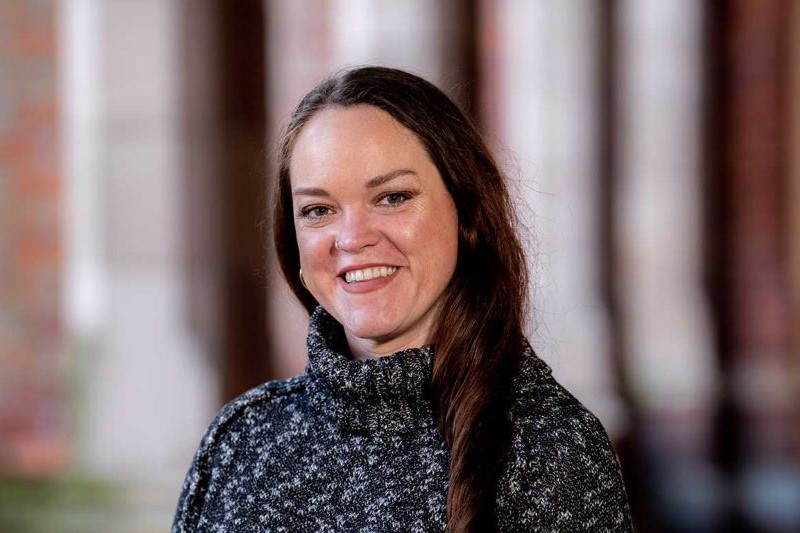
School of SSESW academic Devon Ramey won the Queen’s University Innovation Challenge in partnership with Cogniss, a no-code platform for digital health apps. With the support of Cogniss, Devon developed the ‘Big Feelings’ app, which is designed to teach social and emotional learning (SEL) skills to autistic children using customizable content. More specifically, the app helps children to develop self-awareness and social awareness skills by teaching them to recognize eight core emotions through authentic pictures of themselves and others that are uploaded to the app.
Additionally, Big Feelings teaches autistic children how to handle big feelings such as sadness, anger and frustration by demonstrating various calming strategies for each emotion. These self-management skills are supported in the SOS area, where the children can communicate how they are feeling during periods of overwhelm, and the app will remind them of their calming strategies. Lastly, the children can practice responsible decision-making, social awareness and relationship skills through interactive, choice-based scenarios.
Big Feelings addresses several limitations found in existing SEL apps, such as their simplicity, performance and reliance on cartoons and emojis to teach different emotions. Many of these apps also lack individualization and contextual relevance for the learner. Devon is trialing the Big Feelings app as a teaching tool in her research and will then share the app with families and educators.
The app was developed in consultation with autistic community members and School of SSESW colleagues Nichola Booth and Jenny Ferguson. This unique opportunity was made possible through our Centre for Technological Innovation, Mental Health and Education (TIME).
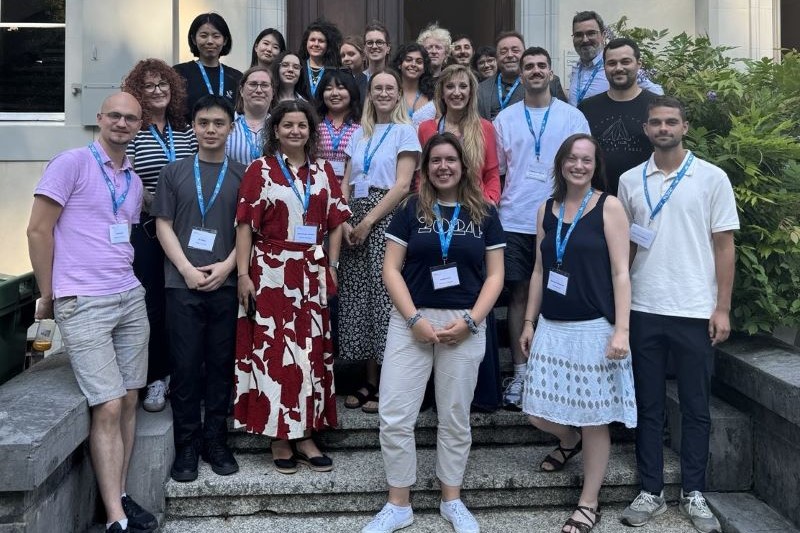
In summer 2024, I had the incredible honour of attending the first European Summer School of Criminology, in Lausanne, Switzerland. As one of only 20 participants selected to attend, I felt truly fortunate to join a distinguished group of emerging criminologists from across Europe. Engaging with peers from countries like Spain, Germany and Slovenia, at various stages of their PhD journeys, was inspiring and humbling.
The Summer School, organised by the European Society of Criminology (ESC) in collaboration with the University of Lausanne, is a groundbreaking initiative designed to foster the education and professional growth of early-career criminologists. The five-day programme featured a curriculum closely aligned with the ESC’s broader mission to strengthen the scientific community and prepare us for the future of criminology. Highlights included opportunities to learn from some of the most respected figures in the field. Their mentorship and insights into conducting high-quality research were invaluable.
The programme not only equipped me (middle row, left) with essential skills for my own research but provided practical guidance on securing research funding, a critical aspect of my future academic career. The ESC’s commitment to bridging current practices with future advancements was evident throughout the course, and I left Lausanne feeling more confident and prepared to contribute to the field of criminology. The connections I made there have already begun to open doors for future collaborations and opportunities.
My time at the European Summer School on Criminology was an enriching experience that I will carry with me throughout my academic journey. It was a privilege to be part of such an innovative and forward-thinking programme. I am excited to see how the knowledge and networks I gained will shape my future in criminology. I encourage other early-career researchers to seek out opportunities like this, as they are invaluable for both personal and professional development.
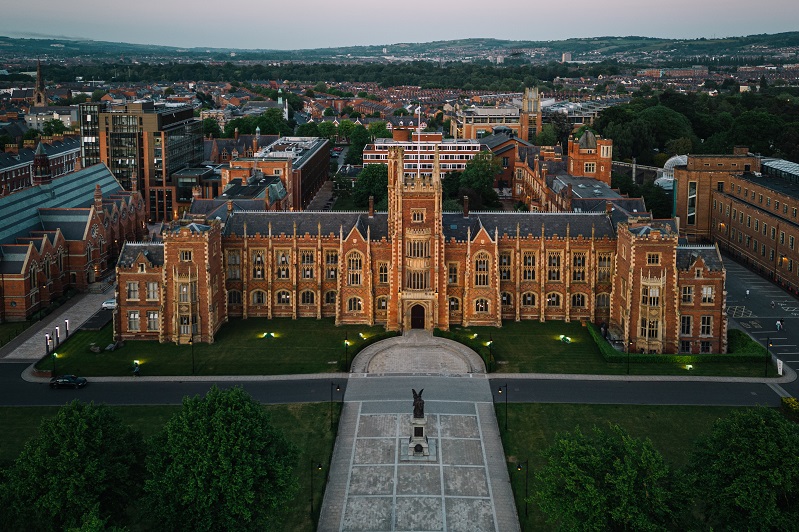
The School of Social Sciences, Education and Social Work (SSESW) is proud to announce the launch of a pilot Research School initiative between Queen’s University and St Dominic’s Grammar School in Belfast. The initiative draws on the expertise of SSESW colleagues to support the school’s teachers in integrating research into their practice. It also offers opportunities for pupils to develop valuable research skills that will prepare them for future academic and professional pursuits.
Dr Caitlin Donnelly (SSESW) commented:
“Through this partnership, we aim to use Queen’s University expertise to foster a culture of rigorous research and inquiry among leaders, teachers and students in St Dominic’s. We are supporting them in building capacity in evidence-informed practice, in order to engage with research in meaningful ways and create lasting impact in education.”
The new Research School initiative emphasizes SSESW’s commitment to community engagement, showcasing the vital role universities play in strengthening links between academia and schools to enhance the educational experience.
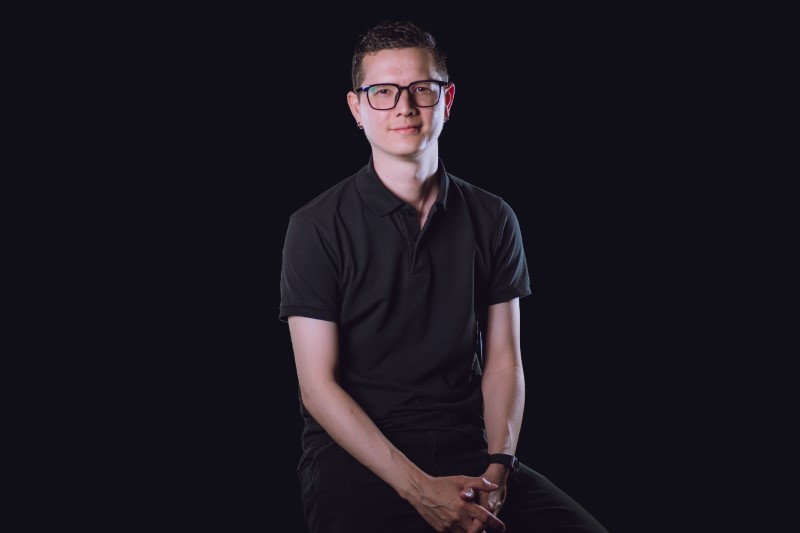
I’ve been a theatre and drama educator for teens and adults for over 12 years. In addition, I’ve adapted these skills for the corporate sector, offering leadership, communication and presentation training. My programmes are dynamic and interactive, often conducted in theatres with games and activities tailored to high-potential employees or senior management. Participants learn real-world skills like interpersonal communication, conflict resolution and emotional intelligence in a safe, engaging environment.
Leadership has always been a way for me to create positive change. The MSc Educational Leadership programme at Queen’s University Belfast focuses on reflective leadership and innovative approaches that resonate with my work, offering insights into managing diverse teams and implementing change - key aspects of my goals.
My parents returned to Northern Ireland a decade ago, while I remained in Malaysia. Now, I’ve relocated to be closer to them and start a new chapter. Queen’s reputation in educational leadership and its emphasis on meaningful change, alongside learning from experienced staff and peers, made it the ideal choice.
Adjusting to the slower pace of life in Northern Ireland has been refreshing, offering peace and reflection. The MSc course has broadened my perspective on leadership, encouraging me to think about how systems influence change and my role in driving positive impact.
There’s so much on offer at Queen’s - it’s inspiring but requires good time management to make the most of it. The Graduate School is an excellent resource I use often, and the library’s online resources have been invaluable.
I am really interested in instructional design and integrating Arts into education and training. I’ve done leadership through theatre and 'whodunit' dinners for my clients. Currently, I’m collaborating on a dynamic course focused on introducing DNA for secondary students interested in biotechnology. I love using storytelling, theatre techniques and gamification to make complex concepts or subjects engaging and accessible.
I aim to combine my background in the Arts and my training on the MSc Educational Leadership to create innovative education programmes on a larger scale. My goal is to empower people to learn and lead in meaningful ways and Queen’s is one of my current stops on the way there.

In September 2024, our internationally renowned Centre for Shared Education (CSE) colleagues, in collaboration with the British Council, hosted a group of around 20 public sector officials and NGO representatives from Estonia, Latvia and Lithuania. The group was on a study tour of Northern Ireland schools and contacts to explore issues relating to conflict transformation. They were accompanied by British Council in-country Directors.
CSE’s Dr Gavin Duffy led a session for the visitors on the role of education in peacebuilding, hosted at the new Limavady Shared Education Campus which brings together St Mary’s and Limavady High School. The briefing was followed by a question and answer session, where the visitors gained valuable insight from the principals and teaching staff of Limavady High School and St Mary's, and included a tour of the new campus.
Relating to the collaboration between our Centre for Shared Education and the British Council, the Centre along with colleagues in Ulster University has been commissioned by the British Council to develop a three day training programme suitable for international groups that would like to learn more about the vital role of education in Northern Ireland’s continuing peace-building process.

A new book on The Racialized Nature of Academic Language, edited by Centre colleague Sultan Turkan with Jamie L Schissel (University of North Carolina), explores the marginalization that English as additional language learners, immigrant or language-minoritized people confront when learning to socialise into using the language of schooling.
A new paper on heritage literacy, based on Ibrar Bhatt’s data collection in Hong Kong, presents a gentle critique of heritage language and how it differs from heritage literacy. Towards Understanding Heritage Literacy was co-authored with Zhen Li (University of Hong Kong).
In November 2024, a celebration of the Yours, Mine and Ours partnership project took place at Queen’s University Belfast. The partnership between Queen’s and Lisburn Museum sustains collaborative relationships with local migrant communities and explores cultural inclusion, belonging and the value of museum learning. Aisling O’Boyle, Centre Director, was awarded a research grant in June 2023 from the UK Centre for Cultural Value to support innovative new partnerships between cultural sector practitioners and academics. The event at Queen's included outcomes from the project, film footage, and speeches by invited guests.
Centre colleagues Mel Engman, Cristina Martínez López and Fionnghuala Nic Roibeaird gave a presentation at the Irish Association of Applied Linguistics annual conference in University College Cork in November. Their paper was well received, generating lots of comments and questions from the conference audience. Title: Multi-sensory languaging with the Irish natural world.
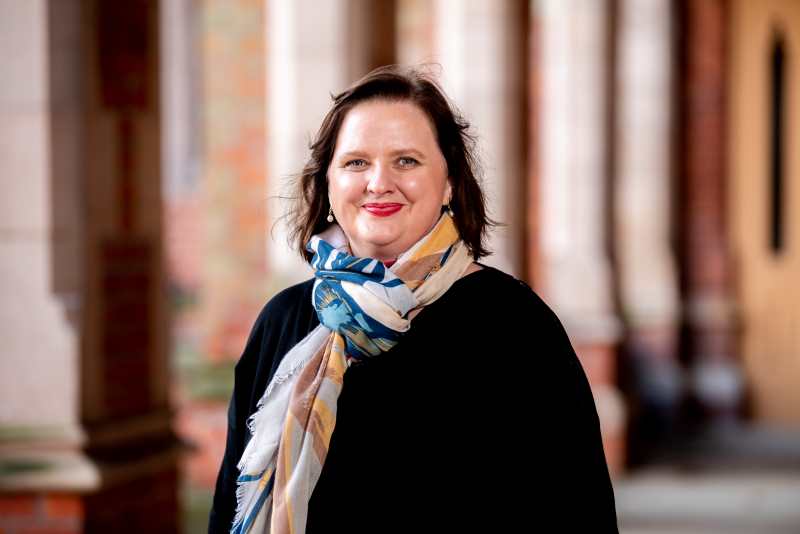
The Queen's on Ageing research network brings together researchers from across Queen’s University whose work is concerned with human ageing. The network also allows them to build connections, to increase the impact of their work and to advocate for older people as service users, citizens and important members of society.
School of SSESW academic Gemma Carney (Social Policy) has been leading the development of the Queen’s on Ageing research network. Gemma commented:
“I have been researching ageing at Queen’s since 2014 and became increasingly frustrated with the barriers to cross Faculty collaboration, so I decided to do something about it. Now, thanks to a successful collaboration with Carmel Hughes in Medicine, Health and Life Sciences and Mihalis Doumas in Engineering and Physical Sciences, Queen’s has a strong presence in research and policy in ageing societies. Our members work on everything from Parkinson’s and dementia to longitudinal research and geriaction movies. The full breadth of gerontological knowledge is represented.”
The network is a member of UKAgeNet, a consortium of 60 leading research centres on ageing, which works with policy-makers such as Chris Whitty (Chief Medical Officer for England and Chief Medical Adviser to the UK Government) in order to tackle the long-term challenges of demographic change.
The Queen’s on Ageing network makes it easier to demonstrate why Queen’s University has an outstanding reputation for research on ageing in medical, social, cultural and allied disciplines. Significantly, the NICOLA project has established Queen's as a key player in longitudinal research - the gold standard in terms of health and policy planning in ageing societies around the globe. The Queen's on Ageing network provides a space for researchers across disciplines to pool their expertise and collaborate on topics relating to supporting and advocating for our older population.
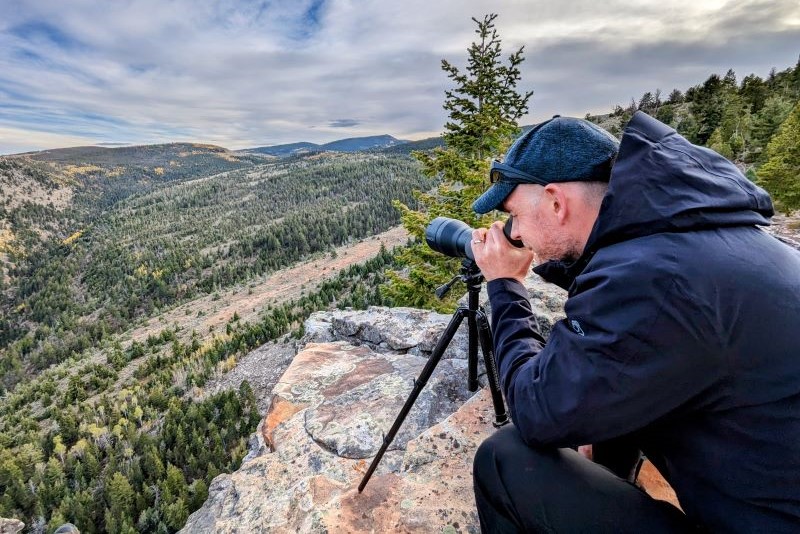
Can social science help us to consider whether livestock farming could coexist with lynx and wolf reintroductions? For a long time in Ireland and Britain, we have been able to outsource our nuanced relationships with large carnivores to David Attenborough and National Geographic. No longer. As lynx and wolves return to many parts of western Europe, the debate about their potential return to these islands is gathering pace.
Current consultations about lynx reintroductions in England and Scotland are the latest of several such proposals over the last decade. Taken aback by the very limited consultation with livestock- and land-owners in Britain or Ireland on this important issue, SSESW colleague Jonny Hanson set out to consider them. For his Nuffield Farming report, he interviewed farming and rewilding leaders across both countries. He conducted more than 40 interviews and visits across western Europe and North America, seeking insights on how coexistence between livestock farming and large carnivore conservation could be managed and governed when these species return to a landscape.
Overall, farming leaders were very sceptical about lynx and wolf reintroductions, mainly for political, economic and ecological reasons. They were also wary of the suite of management tools that can facilitate coexistence between large carnivore conservation and livestock farming: deterrence, finance, force and enterprise. Only governance emerged as an area of common ground between agricultural and rewilding leaders, namely that it is essential in any discussion of potential reintroductions.
And the short answer to our question? Social science is absolutely critical to understanding the feasibility of these proposals. But as this pilot study shows, the reintroduction process itself is likely to be socially complex, contested and costly.
For the long answer to this query, read the Nuffield Farming report or this article in The Conversation.

An ARK event in September highlighted the potential of social and community farming to cultivate good relations in Northern Ireland across racial and sectarian divides. Cultivating OpportUNiTY with social and community farming, organised by Jonny Hanson as part of Good Relations Week, included speakers from Jubilee Farm (Northern Ireland’s first community-owned farm), Cooperative Alternatives and Rural Support. A video is available on the ARK website.
In September, Gemma Carney gave a keynote speech to the British Psychological Society Faculty of Psychologists working with Older People annual conference. Her presentation Critical Questions for Psychologists working with Older People highlighted the gaps between myths and evidence around ageing. For example, research evidence dismisses the idea that retirement is good for us, or that planning for ageing populations is primarily about older people.
ARK’s three annual surveys continue to provide independent and trusted data on public attitudes to key social issues.
A report by Paula Devine and Martina McKnight, with Nicole Bond and Siobhan O’Neill (Mental Health Champion) and based on findings from the 2023 Northern Ireland Life and Times survey, found that nearly half of respondents seeking mental health support or treatment did not receive an intervention within the nine week target highlighted in the Mental Health Strategy.
The 2024 Young Life and Times survey of 16 year olds included questions on bereavement for the first time. The questions were funded by Marie Curie. Dirk Schubotz, Christine Irvine and Joan McEwan reported that respondents were in favour of grief education and bereavement support being offered in schools. These would help destigmatise death and grief and provide young people with a range of tools and practical support measures to help them cope with and understand their own bereavement, and to support others.
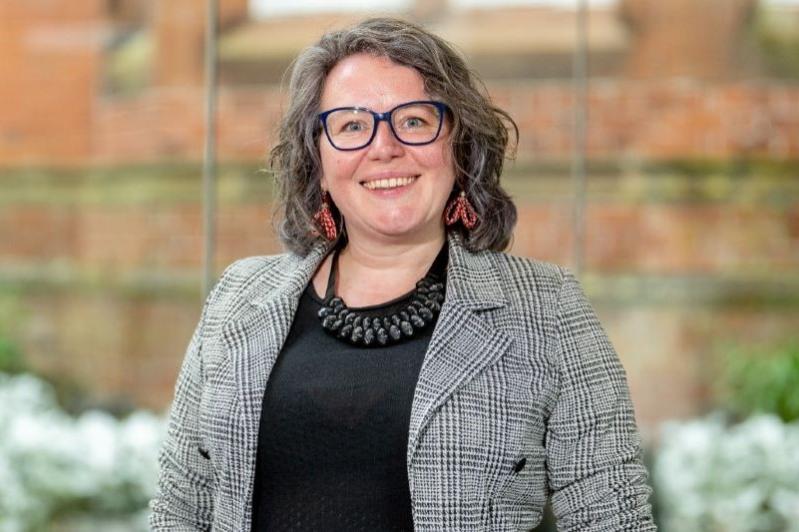
Although I’m now a member of staff in the School of SSESW, I am also a proud former SSESW student, having completed my initial teacher training with a Postgraduate Certificate in Education (PGCE) and later my PhD at the School. Following my PhD, I was delighted to take up a Research Fellowship on a Language Policy project in the School of Arts, English and Languages at Queen’s, investigating young people’s perspectives on languages education.
I rejoined SSESW to take up my Lectureship and continue research which gives prominence to the views of young people, who are at the heart of the education system. As a former French teacher and Head of Department at post-primary level, I have direct experience of the unintended consequences of education policies on the lives of children and young people.
My own research focuses on children and young people’s educational experiences and on education policy. I’m particularly interested in how young people make decisions about education, and constraints on their decision-making.
I am Programme Director for the new BA(Hons) Education Studies, launching in September 2025 with two new degree programmes: BA Education Studies; and BA Education Studies and Sociology. The teaching staff are also active researchers and will share with students their expertise in areas such as educational effectiveness, inclusion, education in deeply divided societies, children’s rights, Teaching English to Speakers of Other Languages and applied linguistics. I was delighted to be appointed as the first ever Director of this programme and look forward to meeting our first cohort of students.
Outside my core work at SSESW, I’m a committee member of the University’s LGBT+ Staff Network ‘PRISM’ and am involved in work across Queen’s which ensures that staff and students can bring their whole selves to their work and study. I also co-convene the British Educational Research Association’s Early Career Researcher Network and am Co-Editor of the online policy journal ‘Languages, Society & Policy’ based at the University of Cambridge.
I have always loved black cats and my favourite pastime is encouraging colleagues and students to adopt a cat! My own cat, Samhain, is opposed to me adopting more cats.
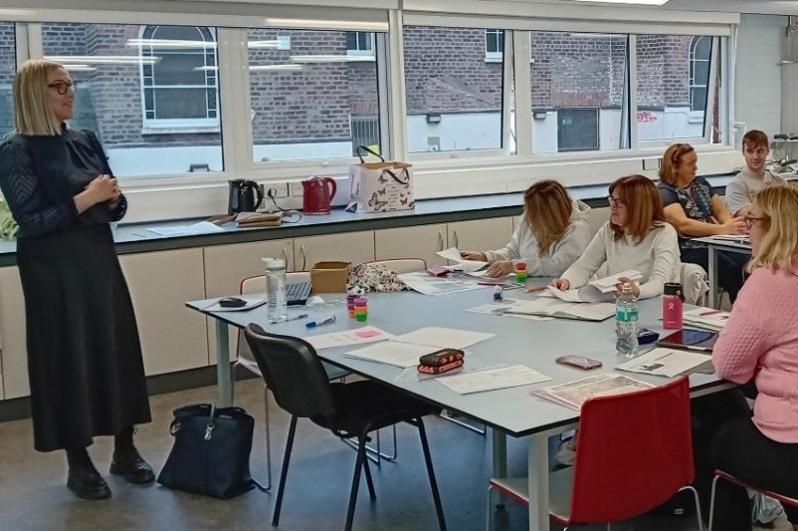
The School of SSESW hosted a STEM Learning event last semester, facilitated in our science lab on the Queen's University campus by long-standing colleague Dr Johanne Brolly from the Royal Society of Chemistry. The two-day event was entitled 'Mastering Chemistry Calculations' and aimed to develop teaching and learning strategies for non-specialists who are teaching up to GCSE Chemistry in schools across Northern Ireland.
STEM subjects comprise science, technology, engineering, and mathematics. STEM Learning’s vision statement is: “We are dedicated to empowering young people with the skills and knowledge to thrive through effective teaching and learning.” The training initiative at SSESW empowered non-specialist Chemistry teachers in Northern Ireland to increase their confidence, skills and knowledge in GCSE Chemistry teaching.
One of the academic hosts for the training event was SSESW colleague Dr Hazel Khamanra (PGCE Science) who commented: “We were delighted with the enthusiasm of the participants, who came from across the province with a range of experience and teaching backgrounds. Special thanks go to Dr Johanne Brolly for all she has contributed to the PGCE Science Course at Queen’s University over the years and to this further professional development for teachers.”
The teachers participating in the STEM Learning programme of training remarked on the benefits they gained from the sessions. One teacher said:
“This workshop has given me additional knowledge as a non-science specialist, which is beneficial for myself and my pupils”. Another participant commented: “I learned new ideas of how to teach chemistry in fun ways.”

The Director of our Centre for Behaviour Analysis, Professor Karola Dillenburger, has been elected as President of the European Association for Behaviour Analysis (EABA). The announcement was made during the 11th bi-annual conference of EABA in Brno, Czech Republic.
Karola said:
“I am delighted and humbled to have been elected as incoming President of EABA. I will be working with an international Board of Directors to serve the community of behaviour analysts as well as those they support all over Europe.”
EABA provides an international forum for the promotion of the science of behaviour analysis in Europe. Behaviour analysis is the scientific study of behaviour that has a wide range of applications, including: supporting autistic children and adults and their families; nurturing education across all sectors, including for those with special educational needs; promoting organisational behaviour management; and generally fostering relationships, inclusion and diversity. EABA includes a large network of individuals, agencies, universities, research centres and Affiliated Chapters that come together to ensure accurate and reliable dissemination of conceptual, experimental and applied behaviour analysis. It nurtures high quality research and education and professional recognition of behaviour analysts throughout Europe.

Dr Katerina Dounavi is working with Dr Javier Virues-Ortega (Auckland University), Dr Meral Koldas and international colleagues on a research project looking at parental perspectives around early life autism identification through genetic testing. The project is at the data analysis stage, with surveys distributed in English, Spanish and Turkish.
Project focusing on the analysis of verbal behaviour: The effects of tact instruction on the acquisition of vocabulary in two foreign languages. Mariana Farias da Cunha (Federal University of São Carlos, Brazil) completed a visit (November 2023 to April 2024) at the Centre, supervised by Katerina Dounavi and supported by the Coordenação de Aperfeiçoamento de Pessoal de Nível Superior – Brasil.
Virtual Reality Classroom (with TIME Centre) - Led by Dr Nichola Booth, this pilot programme is trialling a bespoke VR classroom experience to help young people with an autism diagnosis who attend mainstream school to improve their attendance and classroom behaviours. It combines technology and scientific principles from behaviour analysis to teach, through gamification, ways to help improve school experiences.
The Blue Star Project: Providing vocational training and employment opportunities to young people on the autism spectrum - Helping young people with disabilities, including autism, gain meaningful employment is an important aim towards living an autonomous and fulfilling life. This project, led by Dr Katerina Dounavi, focuses on the evaluation of an innovative vocational training programme and employment placement. It aims to determine best practice that can be used at a larger scale, nationally and internationally.
The eVeRsafe project with Dr Jenny Ferguson, is a multi-national project led by the University of Galway to create a curriculum to teach emergency-related safety skills to autistic adults using Virtual Reality. It involves input from an autistic advisory panel alongside caregivers and professionals and includes a literature review, creating teaching materials and a series of pilot studies.
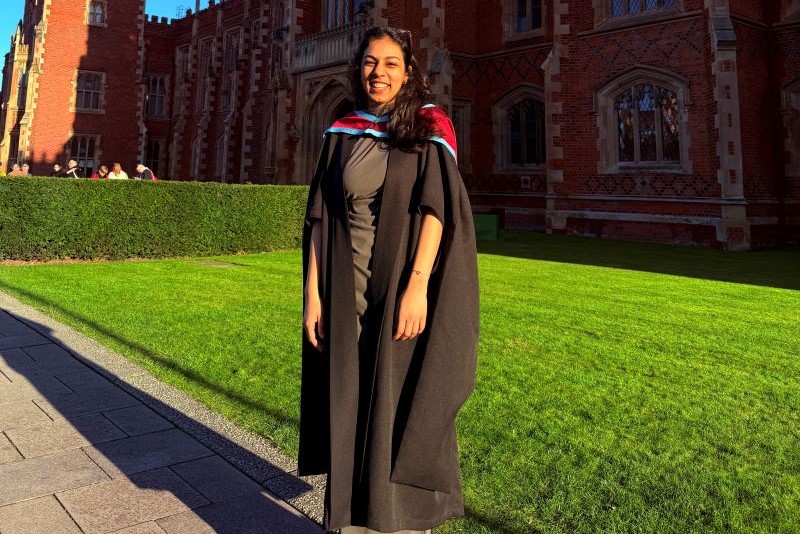
I am a passionate educator with extensive experience in special education, currently working as a Special Needs Classroom Assistant in Belfast, Northern Ireland. Alongside my professional work, I graduated with Distinction in 2024 from the Master’s in Education (MEd) in Inclusion and Special Needs Education at Queen’s University Belfast. My journey as both a student with dyslexia and an educator has fuelled my commitment to creating inclusive environments where every learner can thrive.
During my studies, I worked closely with children facing diverse challenges, including Autism, Attention Deficit Hyperactivity Disorder, and Global Developmental Delay. My work involved developing and tailoring Individual Education Plans, facilitating assessments and fostering a supportive learning environment. It allowed me to bridge academic theory with practical applications, ensuring I could immediately implement what I learned in my professional settings.
Choosing Queen’s University for my postgraduate studies was an easy decision. As one of the top Russell Group Universities in the UK, it is known for its rich history, academic excellence and teaching standards. The outstanding support for international students further solidified my choice. The School of Social Sciences, Education, and Social Work (SSESW) provided a stimulating academic environment that challenged me to think critically about terminology and practices in special education. The Graduate School at Queen’s, with its exceptional resources and workshops, was a standout feature of my journey. It offered training in academic skills such as thesis writing and conducting focus groups, as well as career development courses in leadership, project management and research profiling.
My time on the Inclusion and Special Needs Education programme was transformative. The modules reshaped my understanding of special education, equipping me with the knowledge to support students with learning differences effectively. My personal experience with dyslexia was never seen as a limitation by the academics. Instead, it became an opportunity to share insights, both as a student navigating challenges and as an educator striving to make a difference. This dual perspective enriched classroom discussions and inspired me to continue advocating for inclusive education.
These experiences not only enhanced my skills but also reaffirmed my goal to create a world where no child feels unsupported or unseen. I aspire to implement innovative strategies that celebrate diversity and meet individual learning needs, empowering both students and educators.
In my experience, Queen’s University is an exceptional place for international students, offering outstanding facilities, a welcoming community and unparalleled support systems. I am incredibly proud to be a QUB graduate. Looking ahead, I am eager to continue making a meaningful impact in the field of special education, driving change and ensuring every student receives the support and guidance they deserve. For me, the journey of learning and growth never ends, and I am excited to see where it takes me next.

Dr Siobhán McAlister delivered the opening keynote address at the Journal of Youth Studies Conference in September. The conference was attended by 250 delegates from more than 20 countries. Drawing on her research with children and young people in Northern Ireland over two decades, Siobhan’s paper engaged critically with the notion of a ‘ceasefire generation’.
In September, Centre Director Professor Laura Lundy and colleague Professor Kylie Smith (University of Melbourne) delivered a joint keynote at Griffith University's national conference on extended education in Australia.
Drawing on their combined research, policy and practice experience, Siobhán McAlister was part of a team from Queen’s University, Ulster University, Co-operation Ireland and the cross-Executive Tackling Paramilitarism, Criminality and Organised Crime Programme who produced a discussion paper exploring the persistent presence of paramilitary groups in Northern Ireland. Hosted by ARK and supported by the ESRC Impact Accelerator Account, the paper was launched to coincide with the 30-year anniversary of ceasefires by paramilitary groups in Northern Ireland.
In September, the Centre hosted Dr Holly Doel-Mackaway from Macquarie University, Sydney, who spoke on ‘Ask Us … This is Our Country’: Decolonising Indigenous Children’s Participation in Research and Public Decision-Making. In October we hosted Nicolás Ibáñez Meza, Chile, who spoke on ‘A goal or a tool? About the Legislative Comprehension of the Best Interest of the Child Principle’.
In October, Laura Lundy spoke at the launch of the Irish Department of Education's Expert Review on Student Participation. Laura was appointed by Minister Foley to chair the review group. The recommendations will inform the work of the department in relation to the involvement of students in policy-making in education in Ireland.
Professor Bronagh Byrne was keynote speaker at the Irish National Association of Boards of Management of Special Education annual conference in October. Bronagh spoke on the theme of rights and belonging in an inclusive education system.
